LATIN AMER ICAN IST THE

Bacardi Scholar Flávia Biroli joins “open conversation” at Center
PAGE 4
Students meet authors at new club de lectura
PAGE 5
Charles Wood Thesis Award winner Luísa Bridi Dacroce
PAGE 6


Bacardi Scholar Flávia Biroli joins “open conversation” at Center
PAGE 4
Students meet authors at new club de lectura
PAGE 5
Charles Wood Thesis Award winner Luísa Bridi Dacroce
PAGE 6
DR. CARLOS DE LA TORRE
Congratulations to the MDP and MALAS students that finished their degrees this spring! Some will pursue a Ph.D., others will work for nonprofits, the government, or the private sector. Please keep in touch so we know about your future accomplishments. In the summer, the 2025 cohort will work on their research projects in Latin America and the Caribbean with Tinker Foundation and Center funds. I am looking forward to the Fieldwork Festival in Spring 2025 to learn about their research projects. In the fall, the Masters in Latin American Studies and the Masters in Development Practice programs will welcome new cohorts.
This spring, Dr. Flávia Biroli was the Bacardi Family Eminent Scholar. She is professor of Political Science at the University of Brasilia and a leading expert on gender and politics and Latin American feminism. Dr. Biroli taught a graduate seminar, gave lectures to different UF audiences, and was the keynote speaker for our 72nd annual conference, “Democratic Backsliding and Resistance in Latin America and Beyond.” We had panels on LGTBQ+ rights and democracy, populist challenges to democracy, what is new about the current crises of democracy, and comparative perspectives with presentations from the directors of African Studies and European Studies and two colleagues from the Political Science Department. The conference was a success with 140 people assisting in person, and the recordings are available on our YouTube channel. I want to thank professors Juliana Restrepo, Cristian Pérez, and Carlos Suárez for their work in helping to organize the conference. Professors Biroli and Restrepo are organizing a special issue on democratic
backsliding and resistance for the Latin American Research Review, the most prominent publication in our field, which is currently housed at the Center.
Our faculty continue to produce quality research and regularly receive grants and fellowships. I want to mention and congratulate two colleagues. Dr. Rebecca Hanson was awarded two prestigious fellowships at the David Rockefeller Center at Harvard University, and at the Kellogg Center at the University of Notre Dame. Dr. Meg Weeks’s translation and introduction to Gabriela Leite’s “Daughter, Mother, Grandmother and Whore: The Story of a Woman Who Decided to be a Puta” will be published by Duke University Press in September 2024.
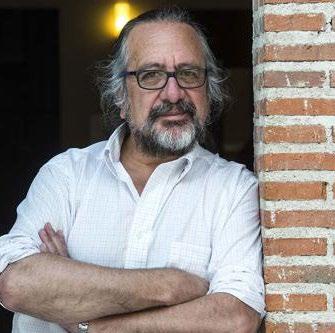
Professor Luis Felipe Lomelí organized a book club and used his networks to invite Latin American authors to talk with students about their work. Because the club de lectura was a success with over 100 people attending, it will continue next academic year. In the fall, we will host Eduardo Abaroa as the first Kislak Family Foundation Artist in Residence. He will teach a class on the history of Latin American art works and organize a collective art project to be displayed at the Art Gallery at UF.
We are proud to have honored Steve Keats with the Lifetime Achievement Alumni Award, and Irving Chan Gomez with the Outstanding Young Alumni Award. The Center’s 73rd annual conference will focus on green business in Latin America and will be a great opportunity for alumni to join in to engage with students and faculty.

Dr. Carlos de la Torre CENTER DIRECTOR
VOLUME 55 NO. 1
SPRING 2024
Center for Latin American Studies 319 Grinter Hall PO Box 115530 Gainesville, FL 32611-5530 (352) 273-4705 latam.ufl.edu
CENTER-BASED FACULTY
Carlos de la Torre Director
Emilio Bruna (LAS/WEC)
Jonathan Dain (LAS/SFFGS)
Glenn Galloway Director, MDP (LAS)
Rebecca Hanson (LAS/Sociology)
Karen Kainer (LAS/SFFGS)
Clate Korsant Asst. Director of Academic Affairs (LAS)
Bette Loiselle Director, TCD (LAS/WEC)
Luis Felipe Lomelí (LAS)
Carmen Martínez Novo (LAS)
Susan Paulson (LAS)
Rafael Ramírez Solórzano (LAS)
Mary Risner Assoc. Director, Outreach & LABE (LAS)
J. Richard Stepp (LAS/Anthropology)
Carlos Suárez Carrasquillo (LAS/Poli.Sci.)
Ariadna Tenorio (LAS)
Welson Tremura Director, FBLI (LAS/Music)
Catherine Tucker (LAS/Anthropology)
Pilar Useche (LAS/FRE)
Robert Walker (LAS/Geography)
Meg Weeks (LAS)
Writer, editor, designer: Christa Markley
Argentine chef visits to local schools offer interactive, handson activities for students 4 5 6 12 16 17 18 20 14 15 10 19 22 26 21 8
Bacardi Scholar Flávia Biroli joins “open conversation” at the Center
Brazilian political scientist shares expertise on gender and political conflict
Students meet authors at new club de lectura
Center faculty and organizer Luis Felipe Lomelí offers students chance to engage with works of contemporary Latin American literature
Luísa Bridi Dacroce wins Charles Wood Thesis Award
MALAS 2023 graduate examined ethnoracial experience of children of Brazilian immigrants in the U.S.
OUTREACH ACTIVITIES
UF hosts leaders in virtual exchange from Brazil, Mexico, for networking and collaboration
FACULTY SPOTLIGHTS
Welcoming new faculty
Meg Weeks
Rebecca Hanson awarded two fellowships for 2024-25
Robert Walker pens periodic column for Interesse Nacional
STUDENT RESEARCH
Fieldwork Festival
STUDENTS AT CONFERENCES
Jorge Arcia Duran, Jorgelina Benitez, Tania Trejo-Mendez, Thais Zschaber
STUDENT SPOTLIGHTS
Beatriz Dominguez forges community bonds through volunteer work
Duvan Gulfo Perea brings mindfulness to peace education
ALUMNI SPOTLIGHT
MALAS alum Nancy Kinnally lends skills to non-profit working to reunite Chilean families
ALUMNI ENGAGEMENT
Alumni Connect event brings alumni, students together
NEWS & UDPATES
Affiliate faculty documentaries, new Latin American library collections, Center staff recognition 24
EVENTS AT A GLANCE
ALUMNI UPDATES & NEWS
DONORS THANK YOU GRADUATIONS
FACULTY UPDATES & NEWS

Brazilian political scientist shares expertise on gender and political conflict
Weeks before Dr. Flávia Biroli would arrive in Gainesville as the Bacardi Family Eminent Scholar, she received an email from the student group of the Tropical Conservation and Development program (TCD). The inquiry: would she consider giving a presentation at Tropilunch, TCD’s weekly guest speaker series?
At first, Dr. Biroli was perplexed. As a political scientist specializing in gender rights and policy in Brazil, would she have something of interest for TCD’s students who work primarily in ecology, biology, and conservation?
The short and simple answer: yes. Dr. Biroli chose to present her ongoing research on feminist movements in Brazil, which intersected with the audience’s interest in topics related to gendered issues on territory and land rights. “The questions I got were great,” Dr. Biroli says. “There’s an environment here [at the Center] that is very open to conversation with colleagues who are working on different issues.”
Over the course of her stay, Dr. Biroli continually encountered this kind of interdisciplinary dialogue, whether it was with faculty members Susan Paulson on politics and care, Meg Weeks on women’s movements in Brazil, or Carlos de la Torre on populist politics, or the students taking her course who represented a more heterogeneous mix of interests than those of the usual political science courses she teaches at her home institution, University of Brasilia. These kinds of interactions happened in classes, at events, and even informally in the hallways of Grinter. “It’s been so interesting to be immersed in such an interdisciplinary environment,” Dr. Biroli reflects. “It’s made an impact on me, to listen and learn from people who are working on completely different kinds of research topics.”
Being at the Center also embodied an ongoing interest in Dr. Biroli’s academic career: connecting more with other parts of Latin America beyond her home country of Brazil. “Comparative research was not part of my research agenda originally,” Dr. Biroli shares. “But over time I grew more and more interested in a regional perspective, so coming here was a great opportunity for me.” With Center students and faculty spanning broad geographic interest, from the Caribbean and Central America down through the Andean Region to the Southern Cone, it was easy for Dr. Biroli to engage more with Latin America as a whole, and its parts.
This multiregional exchange proliferated at February’s annual conference, which featured presentations not only on Latin America (Puerto Rico, Mexico, Nicaragua, El Salvador, Argentina, Chile, Venezuela, Colombia, and of course Brazil) but also other parts of the world (Czechia, Slovakia, Hungary, Poland, Zambia, Ghana, and the United States). All sessions centered on
examining democratic backsliding and resistances in a range of current political landscapes, and the first day's talks focused on how backlash against gender rights plays a role in authoritarian challenges to democracy. Dr. Biroli herself gave the keynote speech, “The crisis is gendered: Approaching the challenges to democracy from the perspective of the disputes around gender,” which presented her research on the regional characteristics of the current political conflicts around gender and the family.
The fact that the conference covered so many regions is a mirror on the reality that Dr. Biroli’s research has grown more and more pertinent not only in Latin America. “It takes different forms in regions and national realities, but all around the world we are going through a moment of backlash against gender rights and gender equality,” she explains. “So my research seeks to analyze and understand the world views and policy proposals of these actors who are reacting against achievements in gender rights and gender equality policy.” While an axis of her research (part of which she presented in the Research Seminar in Politics at the Department of Political Science) focuses on how these campaigns have unfolded in Brazil, her current book project examines the similarities and differences with these dynamics in Brazil, Argentina, and Peru—particularly how religion might illuminate their goals and strategies, considering each country's different religious profile (Brazil growing Evangelical Protestant, Argentina increasingly secular, and Peru still predominantly Catholic).
As Dr. Biroli wraps up the semester and returns home to Brazil, she reflects on her time at the Center, and how the interdisciplinary, multiregional “open conversation” here has impacted her. “I think I take with me a richer, more connected type of thinking about the complexity of the different dimensions of women's rights and experiences in Latin America,” she says. “Of course you have to limit the scope of what you can do in your own research, but it still informs you.”
She also draws a straight line between the culture of academic openness at the Center with a kind of parallel personal openness. “It’s very welcoming in the human sense here, too,” she notes. “Sometimes it’s not so easy to be at another institution abroad, but everything went so smoothly at the Center, with the competence and care of the staff who arranged my stay and how well I was treated by all of my colleagues.” She pauses, then smiles. “So I think I take away some friends, as well.” ◆


Center faculty and organizer Luis Felipe Lomelí offers students chance to engage with works of contemporary Latin American literature
This semester, Center faculty Luis Felipe Lomelí hosted the “Meet the Author” Club de Lectura, in which students could read works by contemporary Latin American authors and then have the unique chance to discuss the reading with the authors themselves. The works reflected a wide range of genres and regions across Latin America; five sessions connected the authors via Zoom, and a sixth session brought the author, Yolanda Arroyo Pizarro, to Gainesville in person.
Read more from Dr. Lomelí about this literary endeavor:
Q: What were your goals for the club de lectura?
LOMELÍ: The main goal of “Meet the Author” Club de Lectura was to create a ludic space for UF students interested in Latin America—a relaxed, not-graded-assignments place where we all could share ideas and talk about cultures, literatures, and societies south of the Rio Grande/Río Bravo using a book as a pretext for the meeting. Participants could improve their second or heritage language and, luckily for the Center for Latin American Studies and for the Department of Spanish and Portuguese Studies, some of them could be motivated enough to pursue further study for a minor or major. As additional goals, the club seeks to create bonds and cultural bridges with the greater Gainesville community and to promote UF in Latin America and other academic spaces in the United States. By the end of these sessions, we had international participants (not counting the authors), non-UF faculty participants, and attendees from the greater Gainesville community, including students from Santa Fe College.
Q: How did you select the particular works and authors?
LFL: UF students’ interests in Latin America vary broadly. Accordingly, we wanted to reflect this ample spectrum of interests in our selection of authors and works, both regarding the book’s topics and the geographical and cultural background of the authors. Thus, we had one author from the Caribbean (Yolanda Arroyo Pizarro), two from South America (Alejandra Costamagna and Luis Carlos Barragán) and three from Mexico
and Central America (Mario Martz, Daniel Rodríguez Barrón, and Florentino Solano). Five of them write directly in Spanish and one of them writes in a Native American language, Tu’un Savi (and then translates his own work into Spanish). Regarding the topics and styles, we read one poetry book, one environmentalist novel, two sci-fi books, and two realistic narratives (one of these with an emphasis on Latin American politics and the other with an emphasis on domestic life). In all the cases, we avoided works with extremely complicated syntax and vocabulary, and focused on engaging, page-turning books.
Q: What is particularly meaningful about a book club where students can meet the authors?
LFL: I believe there are several meaningful aspects about any book club, from building community to practicing another language, plus getting a broader and deeper understanding of other cultures. But maybe the most particularly meaningful thing about an informal book club where you can talk directly to an author is that it places authors and readers on the same level. It promotes a horizontal conversation, from human being to human being. Thus, the unattainable aura that sometimes surrounds authors and books in traditional literary courses is erased. It makes all participants, and especially students, start believing that they can become authors too. Having an informal conversation with someone who has already published several books empowers students to believe even more in their own voices and ideas.
Q: What were the main successes of the book club? What do you hope students gained from the experience?
LFL: I guess my main surprise was the high attendance rate. Usually, book clubs have no more than five attendees per session, but we had six sessions and over 100 participants in total. I believe all the students were able draw connections with other worldviews, to find things in common and to reflect on the differences between their reality and Latin American
CONT'D ON PAGE 7 ►
Luísa Bridi Dacroce (MALAS 2023) is the winner of this year’s Charles Wood Thesis Award, for her thesis titled "Asterisked Identities: Navigating Race as Children of Brazilian Immigrants in the United States." Luísa's research sheds light on the Brazilian experience within U.S. Latinx migration and diaspora. She is currently continuing her studies at the Teresa Lozano Long Institute of Latin American Studies at University of Texas at Austin, where she is pursuing a Ph.D.
MALAS first-year Jorgelina Benitez had a chance to meet with Luísa and chat about her thesis and research interests:
As a Brazilian and first-year MALAS student, talking with Luísa made me reflect on my own ethnoracial journey as a Brazilian immigrant in the United States and how personal experiences can influence our research interests within the MALAS program. This conversation emphasizes the power of individual narratives in shaping our academic journey.
JORGELINA: What motivated you to pursue your master’s degree at the University of Florida?
LUÍSA: I wanted to work with Dr. Nicholas Vargas, who is unfortunately no longer at UF. I wanted him to be my mentor and my thesis advisor. I also wanted to research the Brazilian diaspora, and Florida is a great place to start. It's a great place to make connections and find participants. Also, I had friends in the surrounding areas, so I had a support system.
JB: What motivated you to pursue your thesis research topic?
LBD: It was a little bit of “me-search” at first because I wanted to understand being a white Brazilian in the US. I wanted to understand better how other people were navigating the same experiences as me. When I told them I was Brazilian, I noticed many people would be surprised. And they would say, “oh, I thought you were white,” or “oh, but you're white.” So, they were confused. Also, some people would say, "Oh, you're Brazilian, are you Latina? Or not? Are you Hispanic or not? So, those experiences with identity, contestation navigation, and having to negotiate my racial identity motivated me to understand how others, in similar situations, negotiate their own identity in the US ethnoracial hierarchy. Eventually, I became particularly curious about the children of Brazilian immigrants. While doing my literature review, I noticed that there was barely anything about their experiences, so I became particularly curious about how they might navigate this system.


JB: What do you think they expected to hear when you said you are Brazilian?
LBD: Most people thought I was American, and they would say, "Oh, you don't have a thick foreign accent.” I think many were surprised to learn that I'm Brazilian because I'm white. I think a lot of people are surprised to know that there are white Brazilians or white Latin Americans in general, especially in the US. In this country, there is usually a conceptualization of Latinidad that is inherently brown. People are confused when you don't fall under that prototype.
JB: What surprised you about your research findings and/or process?
LBD: When doing my literature review for my thesis, I found a few articles looking at children of Brazilian immigrants' ethnoracial identity. In those articles, none of them identified as Latinos. I wanted to see if my participants would say the same. The previous research was focusing on Brazilians in Massachusetts. So, I was curious if children of Brazilians living in other parts of the country were saying the same. One thing that surprised me was that all my participants identified as Latino/a/e and claimed this identity. I was not expecting that based on previous literature, but it was interesting because it did mirror my own identification.
JB: What were some of the specific characteristics of your group of participants?
LBD: Most of my participants had both Brazilian parents. But there was one whose father self-identified as Brazilian. He was from another Latin American country but was raised in Brazil since he was three. Another participant’s mother was a US-born Latina, and her father was a Brazilian immigrant. They ranged from 18 to 27 years old. I chose this specific generation because I wanted to focus on their experiences with navigating ethnoracial identity having experienced both Brazilian and US ethnoracial systems.
JB: What were the challenges of doing your research?
LBD: Identifying participants was a little challenging because it's a hidden population. You cannot look at someone and say, "Oh, that's a Brazilian. That's the child of a Brazilian.” So, I had to rely on personal networks, snowball sampling, and the Brazilian student associations. So, I reached out to some of those
resources. I just asked if they knew any child of a Brazilian immigrant who was already a young adult. I found people in Florida and Ohio, and I did my interviews via Zoom because it was the most convenient way to conduct them given the time constraints of a master's thesis.
JB: How was your experience at the Center for Latin American Studies at the University of Florida?
LBD: I was fortunate enough to be at UF at a time when Dr. Vargas and Dr. [Christopher] Busey were also there. They were very formative in building the foundation of myself as a scholar. So, I had the opportunity to connect with great mentors and build essential knowledge for the type of work I wanted to do. I was also fortunate to have an outstanding cohort, and I was able to learn from other people from very different backgrounds and perspectives. So, it was, for me, a beneficial experience. It was very enriching.
JB: What are you doing now? How has your master's degree prepared you for your current work?
LBD: I am pursuing a Ph.D. in Latin American Studies at the University of Texas at Austin. MALAS was very important in helping me define who I was as a scholar. When I finished my undergraduate degree, I was still
◄ CONT'D FROM PAGE 5
determining how I wanted to approach research. I knew I wanted to pursue graduate school, but I was not sure how I would do that. MALAS was an excellent opportunity to develop myself as a scholar and determine the type of research I wanted to do. Especially with it being an interdisciplinary program, this allowed me to have contact with different fields and methods and figure out which ones make more sense to me. So, it helped me prepare. It was the foundation for preparing the type of scholar I am and the type of scholarship I want to do.
JB: What advice do you have for current or future MALAS students?
LBD: Keep in mind that it's an interdisciplinary program. It's important to enter the program knowing you must be proactive in finding the best coursework for your project. That's one thing that will be different from a program with a more structured curriculum, and it has its benefits. It has its challenges, too, but mainly it gives you a lot of agency to determine what matters to you. That can be overwhelming, so I recommend working through your goals with faculty and mentors and ensuring that you are on track with what you want to do and following the steps you need to succeed, whatever success looks like for you. And take advantage of your cohort and the community at the center,
realities. Some participants were able to explore and discuss specific ideas and writing techniques that interested them, others were able to listen for the first time how poetry sounds in a Native Latin American language, some others were certainly able to imagine how their own past allows them to imagine different possible futures, and some others were able to connect their own life experiences with the experiences of other people across the continent to create a sense of community, et cetera.
Q: Do you have a favorite moment from one of the sessions?
LFL: All sessions of the book club were engaging and marvelous in different ways. For example, our session with Daniel Barrón diverted into a profound discussion on animal rights and environmentalism (with some participants pursuing majors in zoology and development studies); our session with Mario Martz drifted into his very personal experience on orphanhood under the autocratic Nicaraguan regime which echoed with the personal experiences of other participants from Cuba and Venezuela… and with Yolanda Arroyo there
including the staff. They are wonderful. They're ready to help you with anything you might need. And the students, because it's an interdisciplinary program, you have people from all backgrounds and different points of view in the same classroom or space. It's a great opportunity to learn from and grow with each other. It was really helpful to exchange ideas with my classmates and cohort members to get feedback and think through ideas with them.
JB: What's next for you in your research?
LBD: It's a work in progress. I'm still defining what I want to focus on next. There are several aspects that I find interesting. Several developments could be made to this research, so I'm still trying to narrow down what I will do. Luckily, I still have about four years of the program to do so. However, I want to expand on my thesis and look at the broader dynamics of interethnic relations, ethnic solidarity, and identity politics among Latinos in the US.
JB: Any final remarks?
LBD: I would like to thank the staff, faculty, and my cohort, the people I had the opportunity to meet through MALAS. The community was the most important thing I got from that experience. I also want to thank everyone who helped me navigate the program and finish it. ◆
were, literally, tears and laughter. So, each of the sessions were wonderful in their own particular ways.
Q: What are your plans for a future book club?
LFL: Next semester we will continue with the book club, in the same format and spirit but with different authors. We plan to have two authors from the Caribbean (Rey Andújar, Dominican Republic and Sergio Gutiérrez Negrón, Puerto Rico); two from South America (María Ospina, Colombia and Giovanna Rivero, Bolivia and UF alumni), and two from Mexico and Central America (Federico Vite and Nadia López).
Once again, one book will be poetry while the others will be short stories collections and novels, and two will be bilingual books (Tu’un Savi–Spanish, and English–Spanish). The topics of the books will also vary and we will include, for example, a crime fiction novel and a book of short stories concerning drug trafficking related violence in Mexico. I hope that we continue to have many attendees participating in the fall. ◆
Speakers and attendees examined conditions of democracy over two-day event
The Center's 72nd Annual Conference, "Democratic Backsliding and Resistances in Latin America and Beyond," was held on Thursday, February 29 and Friday, March 1 in Smathers Library Room 100. Across four themed panels and one keynote, sixteen speakers came to Gainesville to discuss current conditions of democracies with our UF audience and community.
The panels and ensuing Q&A sessions covered LGBTQ+ and gender rights, current crises of democracy, populist challenges to democracy, and comparative perspectives on democracies in Europe, Africa, and the U.S. in addition to Latin America. Bacardi Family Eminent Scholar Dr. Flávia Biroli (University of Brasilia) was the keynote speaker and
addressed challenges to democracy from the perspective of gender disputes.
The conference speakers came from universities across the U.S. and Latin America, including from the UF Center for African Studies, Center for European Studies, and the Department of Political Science, units which also co-sponsored the event. Additional sponsors were George A. Smathers Libraries, the Center for the Humanities and the Public Sphere, the Center for Gender, Sexualities, and Women's Research, Sweetwater Branch Inn, the Bacardi Family Foundation, and the USDOE Title VI grant.
Approximately 140 people attended the conference over the course of the two days. In addition to students, faculty, and
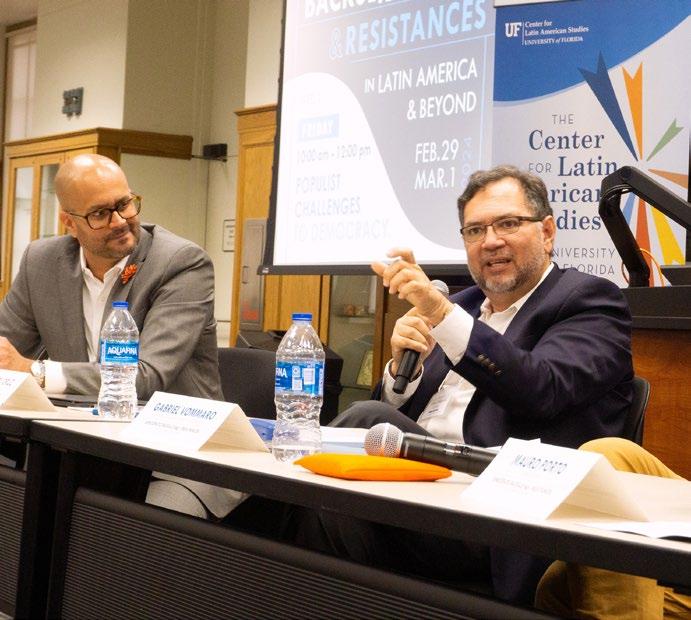
sessions on Saturday.
All conference session recordings can be viewed on our YouTube channel at youtube.com/uflatinamerica ◆
• The Guyana-Venezuela Border Controversy Mark Kirton˚ [9]
• Meet the Author Club de Lectura Seis sesiones del club de lectura con escritores latinoamericanos˚ [see p. 5]
• Las Diez Caricaturas Más Racistas en la Historia de Colombia Óscar Perdomo Gamboa˚ [12]

• Book launch | A Tale of Two Granadas: Custom, Community, and Citizenship in the Spanish Empire Max Deardorff* [4]
• Annual Conference | Democratic Backsliding and Resistance in Latin America [1, 3, 8]
• Socio-environmental Governance & Justice in Latin America Catherine Tucker*, Stephen Perz*, Joel Correia˚
• Fieldwork Festival [see p. 12]
• Las cenizas del Ave Fénix: Etnicidad y protesta social en los Andes Víctor Bretón˚ [7]
• LAS Alumni Connect [see p. 21]
• Afro Roots Fest | Afro-Cuban Convening featuring Welson Tremura*
• Book presentation | The Sandinista Revolution: A Global Latin American History Mateo Jarquín˚, Leslie Anderson* [2]
• Betting on hope: Experiences of migration from a comparative perspective across Central America and Spain COLOQUIO with Catherine Tucker*, Tatiana Avignone˚ [11]
• Feminist Movements and Democracy: Resisting Democratic Backsliding in Brazil Tropilunch with Flávia Biroli* [10]
• Far-Right Politics, Gender, and Democracy in Brazil with Flávia Biroli*
• Jacaré Brazil featuring Welson Tremura*
• Challenges to Sustainable Farming in Highland Ecuador Barry Lyons˚ [6]
• Fostering Collaboration between UF and the University of Azuay, Ecuador Marcelo Calle˚ [5] ˚Guest speaker from outside institution † Center student or alum *Center faculty (Core, affiliate, or visiting scholar) Watch on YouTube! youtube.com/uflatinamerica Note: Tropilunch, Jacaré Brazil can be found on TCD , Welson Tremura's channels
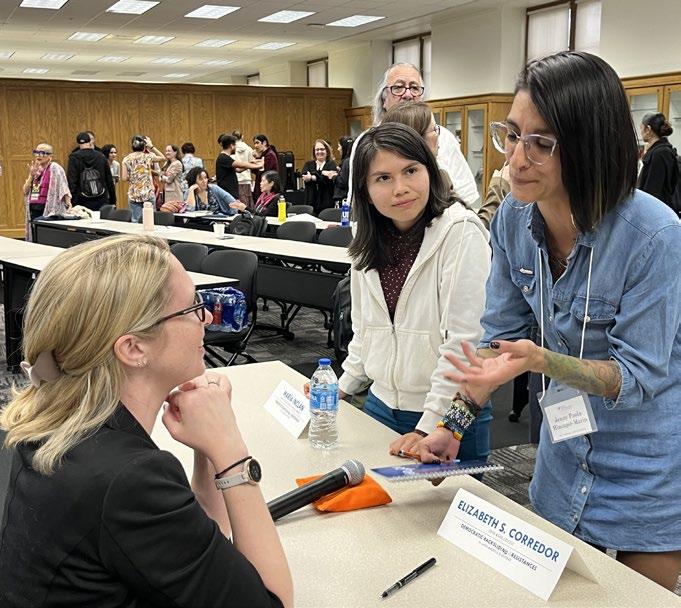

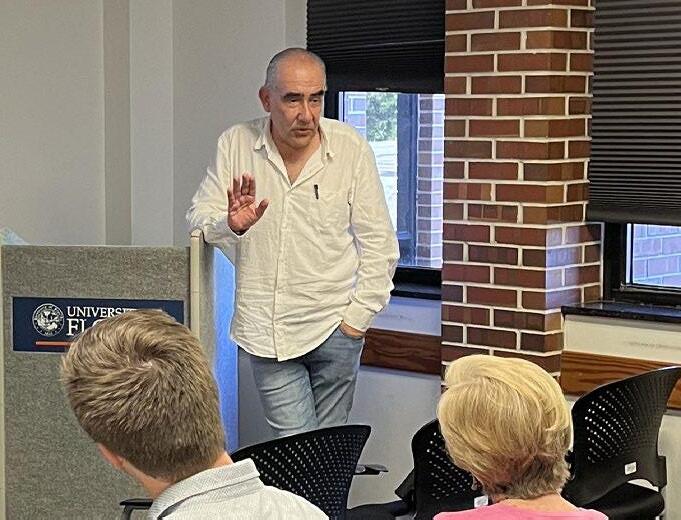


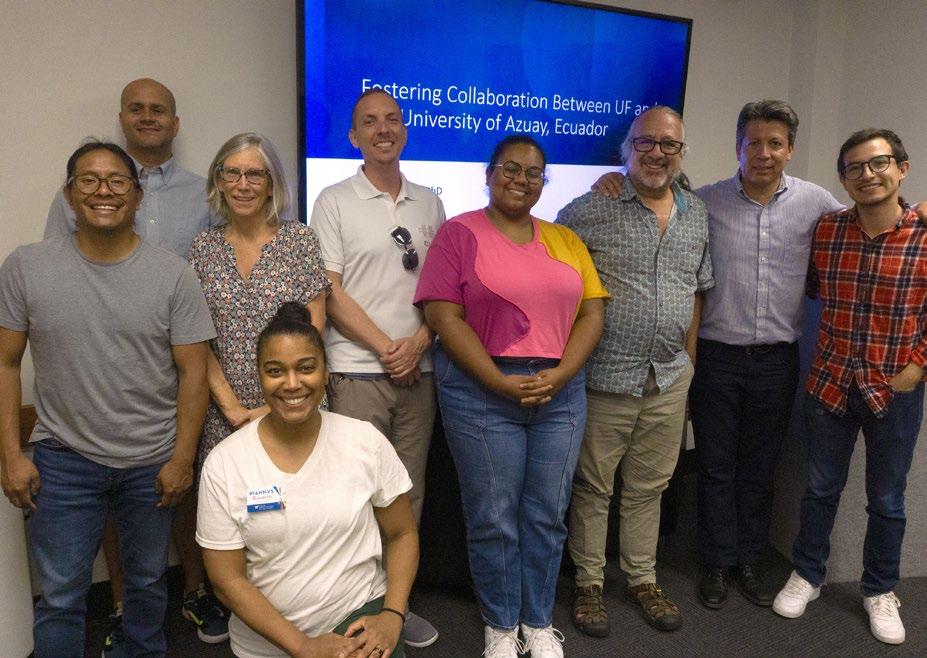
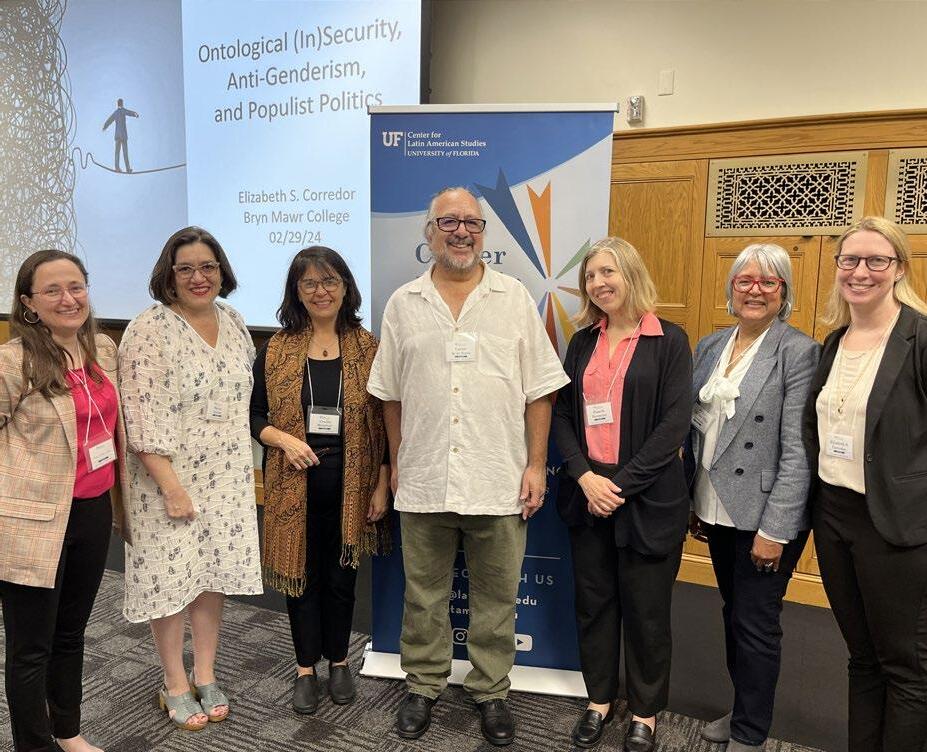

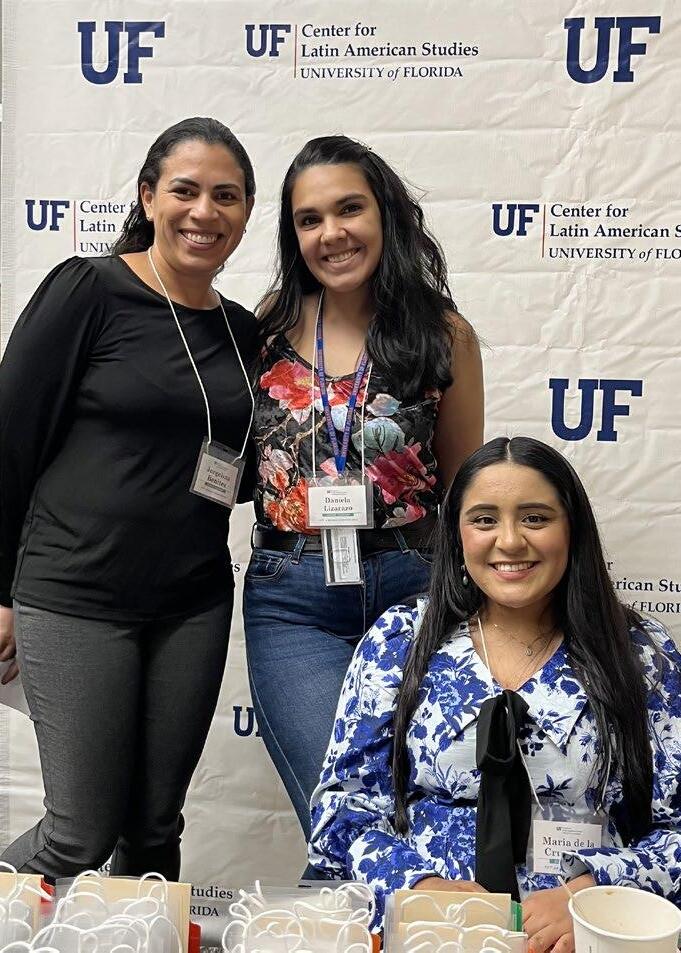
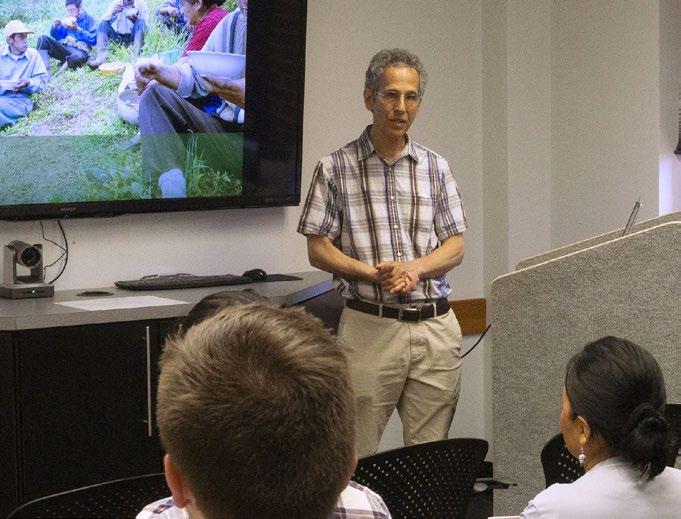







VE experts Drs. Ana Cristina Biondo Salomão and Verónica Rodríguez Luna shared experiences, insights, and opportunitites
The Center continues to collaborate with the UFIC Office of Global Learning (OGL) to promote virtual exchange as a valuable way to internationalize curriculum and connect students from different parts of the world through project-based learning. Because of the efforts of Drs. Ana Cristina Biondo Salomão (São Paulo State University) and Verónica Rodríguez Luna (Universidad Veracruzana), VE programs and networks have been expanding throughout the region.
Co-organizing with OGL's Paloma Rodriguez, the Center hosted Dr. Salomão and Dr. Rodríguez here in Gainesville to build connections for future collaboration and developing VE networks. During their visit, they met with various UF faculty and staff and were guest speakers at UFIC's Global Learning Luncheon, where they shared their experiences and insights about establishing VE networks in Latin America. Read on to learn more about our two guests and their time at UF:
Q: Can you talk about the importance of growing these Latin American VE networks and expanding opportunities in the languages of the region?
VRL: Growing these Latin American VE networks can be key for promoting global citizenship in Latin America, enhancing cultural exchange, developing the intercultural competence, encouraging collaborative learning, and offering an international experience to the large number of Latin American students who cannot travel abroad. Latin American VE networks can also expand opportunities in the languages
of the region by promoting exchanges in different languages, and in this way celebrating linguistic diversity.
ACBS: For Brazil, it is very important to grow these partnerships with our neighboring countries to strengthen South to South cooperation. We speak languages that have similarities and are intercomprehensive (Portuguese and Spanish), so this opens up a good communication channel for joint projects and for exploring our similar-different cultural backgrounds.
Q: What did you like most about the trip?
VRL: I really like meeting wonderful Deans, Directors, Associate Directors, faculty, staff, and sharing ideas about VE and its rapid growth in Latin America and in many institutions in the United States.
ACBS: It was a short but intense stay at UF. It was very interesting to get to know different people from diverse areas and to talk to them about possibilities for partnerships for VE and other projects. I was amazed at the size of the university and it was great to visit the museums and learn about how you make use of these resources in teaching and learning.
Q: What are you takeaways from the visit?
VRL: I learnt how VE is being promoted in UF, and how important UF is in the region, which can make UF a great leader in VE in the State of Florida.
Q: What are you envisioning as possible next steps to collaborate with UF and all institutions across Florida?
VRL: This visit will surely strengthen the collaboration between UF and Universidad Veracruzana through more VE projects. I envision that in the near future the Latin American COIL Network, the BRaVE Network, and the Florida VE Network will collaborate to continue growing VE in Florida and in Latin America.

ACBS: I think the main takeaway for me is that we need to tighten the bonds of strategic partnerships. This visit was very important in that sense. UNESP and UF already have lots of collaborations between professors and researchers and we need to nurture the projects from an institutional perspective to be able to give the necessary support for them to be lasting and prolific.
It was a great experience! Thank you very much for the invitation, and I am looking forward to more projects for connecting Florida with Latin America!
ACBS: I think the next step for Florida would be to constitute a VE network for the region and collaborate with other networks in Latin America, such as BRaVE (Brazilian Virtual Exchange) and Latam COIL. This would be a way of building up strong connections and learning from each other on how we can structure and keep long standing VE partnerships. Many thanks to Mary [Risner] and Paloma [Rodriguez] and all the great UF staff that welcomed us so warmly. ◆
Interested in incorporating a VE project into your curriculum?
OGL offers training for UF faculty during the academic year (go.ufl.edu/ufic-ve) and the LAS Outreach program offers an online summer training for non-UF state college and K-12 faculty (go.ufl.edu/latam-ve)
High school students connect with Latin American culture, engage with local entrepreneurs, and practice technical skills
The LAS Outreach program continues to coordinate with chefs of Latin American cuisine to visit local schools for hands-on cooking demonstrations. This February, Chef David Stach of New Smyrna Beach showed culinary students from New Smyrna Beach High School how to prepare Argentine specialty lomito, a kind of steak sandwich. Not only did the students learn more about Argentine food culture and typical spices, they had the chance to practice their food preparation skills... with a delicious result to culminate the experience! Previous chef visits have engaged career and technical education students with Peruvian culture and cuisine. ◆
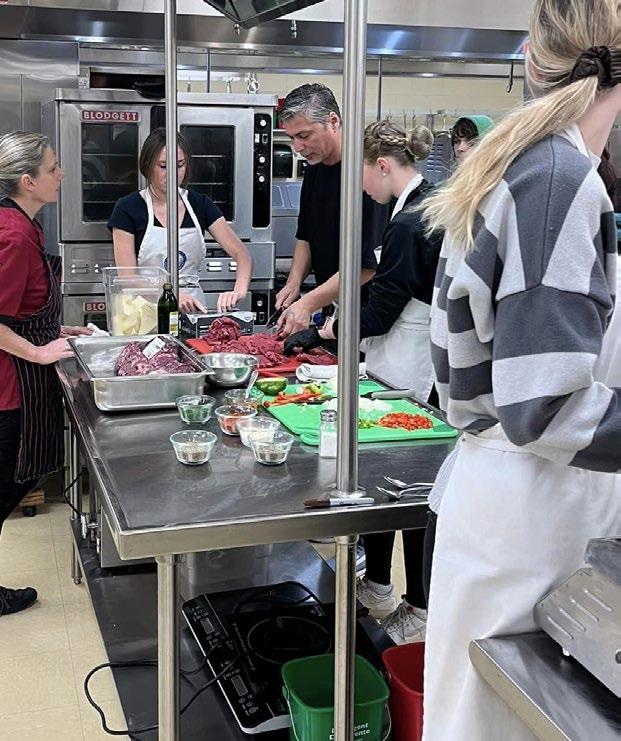


Professor Meg Weeks is the newest professor to join the Center's core faculty. A historian of modern Latin America focusing on Brazil and women's history, Dr. Weeks taught the spring course "Social Movements and Gender in Latin America." Daniela Lizarazo (MALAS 2025), one of the students in that class, had the chance to sit down with Dr. Weeks and learn more about her:
DL: Profe, what brought you to your field in academia?
MW: I study women's history, specifically grassroots women's mobilizations, and also issues surrounding reproduction and reproductive rights, as well as labor and sexuality. These were always things that interested me even before I became an academic. I was drawn to history because of its focus on archival research, and going back to the sources to read what people wrote, and learn what they thought about what was happening to them. That has always been really compelling to me.
DL: What is your research and academic writing about?

MW: My first book project is about sex workers and domestic workers in Brazil during Brazil's democratic transition and in the aftermath of democratic consolidation in the 1990s. So, I'm thinking about ideas of what women’s work is, and how women mobilize around archetypes of femininity, whether reinforcing them, challenging them, or leveraging them for political advantage. My research starts in the 1960s, and then goes through the election of Lula, the first election of Lula in 2002. I also have some nonacademic writing projects for magazines and literary journals on art, feminism, and labor reproductive rights, mostly in Latin America. [Dr. Weeks is also a translator; she recently completed the English translation of “Daughter, Mother, Grandmother, and Whore,” by Brazilian sex worker activist Gabriela Leite. It will be available in September 2024.]
DL: What do you hope to contribute to the Center?
MW: I suppose I have a diverse skillset that I bring with me in the work that I do, as a historian and a Brazilianist, working with gender and sexuality as well as literature and language. I hope to contribute by working with students and being committed to you all and the work that you're doing, and helping you, whether you're thinking of going into a professional field after the degree or thinking of the degree as a stepping stone to a PhD. I hope that as an educator I can get you on a path to pursue your next step. ◆
Project on criminal governance and authoritarianism gains support from Harvard University, University of Notre Dame
Center professor Rebecca Hanson has been awarded two fellowships for the academic year 2024-2025. In the fall, Dr. Hanson will be a Peggy Rockefeller Visiting Scholar at the David Rockefeller Center for Latin American Studies at Harvard University. In Spring 2025, she will be a visiting fellow at the Kellogg Institute for International Studies at the University of Notre Dame.
During her fellowships, Dr. Hanson will be working on her project "Conceptualizing Criminal Governance in Authoritarian Contexts," in which she will analyze the relationship and dynamics between armed groups and authoritarian governments and how they have evolved over time. Dr. Hanson will draw
from ethnographic, interview, and survey data collected over a ten-year period. “I have amassed a lot of data from projects in countries like Colombia, Honduras, and Venezuela," Dr. Hanson shares. "But with other projects I've been completing, plus classes, I haven’t been able to do much with it. The fellowships will give me time to work with this data and start drafting publications.”
This forthcoming project branches from a book project that Dr. Hanson is currently completing, under contract with Oxford University Press. In both projects, Dr. Hanson seeks to understand how authoritarian power operates in contemporary Venezuela. Building on this previous research on policing and state violence during Chavismo in Venezuela, she plans to map the diverse relationships between the Nicolás Maduro government and armed groups to explore the ways in which they shape how governance, social control, and a fragile order are constructed.
Dr. Hanson points out that the case of Venezuela is unique, given that the current authoritarian government evolved from a leftist political project, and coercive power was decentralized into nonstate armed groups, rather than centralized within the regime. Because of this, Dr. Hanson's project offers a distinct contribution to conversations on plural violence, shattered sovereignty, and criminal governance in the Global South.
By the time Dr. Hanson returns to Gainesville, she plans to have a prospectus for a book, as well as some chapter drafts. As with all her work, Dr. Hanson is especially motivated to share her research beyond academic circles, as it may help serve future policy development and implementation. Therefore, in addition to a book, she also plans to summarize findings from the data analysis and write a report on their implications for future peace processes, to be published with the Venezuelan NGO REACIN

(Red de activismo e investigación para la convivencia / Activism and Research Network for Coexistence).
Like with any fellowship opportunity, the chance to engage with and learn from other scholars offers significant benefit—and appeal. “There are incredible scholars at Harvard and Notre Dame who work on topics similar to mine and I am really looking forward to learning from them and growing as a scholar during my time there,” Dr. Hanson says. “The focus on democracy, authoritarianism, elections, and crime at the David Rockefeller Center for Latin American Studies makes it an ideal place for me to develop my project. At Notre Dame I am particularly excited about the Notre Dame Violence and Transitional Justice Lab, as I have recently been discussing potential scenarios for transitional justice processes in Venezuela with colleagues.” ◆
Publication gives platform to reach Brazilian audience, in Portuguese, on Amazonian conservation issues
Since March 2023, Center professor Robert Walker has published a regular column in the Brazilian digital publication Revista Interesse Nacional. Over the course of eleven articles, Dr. Walker has written on Amazonian conservation, tackling topics like deforestation, Indigenous rights, hydroelectric power, and Chinese investment in the Amazon, among others.
This endeavor is motivated by Dr. Walker’s self-avowed commitment to an absolute conservation in the Amazon, and a passion to raise warnings about what he calls “a tipping point,” whereby the sprawling ecosystem would undergo a level of destruction beyond the possibility of recovery. This would portend global ramifications as well as regional, given the prominence of the Amazon rainforest in the earth’s ecosystem. “If people genuinely want to have a forest there past the 21st century, there's going to have to be dramatic action taken,” Dr. Walker advises. “I'm always writing with that sense of emergency.”
Given the complexity and urgency of the challenge, there’s no shortage of topics for Dr. Walker to cover in his column. One guiding touchstone is the upcoming COP30 conference, which will take place in November 2025 in Belém, Brazil (notable for its location at the gateway of the Amazon River). The conference is the annual meeting of the United Nations Framework Convention on Climate Change, which brings together governments and other sectors to create global milestones for climate action. Brazilian president Luiz Inácio Lula da Silva has shown enthusiasm for Brazil hosting the climate conference within the Amazon, and even announced a plan to eliminate deforestation in the country by 2030 during the COP27 conference in 2022.
“He's making a really big global gesture about his environmental credentials,” said Dr. Walker of Lula da Silva’s pronouncements. “But it's still unclear how he plans to act on them.” One of Dr. Walker’s articles in Interesse Nacional, aptly titled “Promessas, promessas, promessas,” from May 2023, expresses this exact drive to call attention to meaningful climate action beyond political promises. Going forward, he hopes to lay out talking points and arguments about Amazonian conservation in the lead-up to COP30 next year.
The opportunity to publish regular columns, in Portuguese, for a Brazilian audience, is not one that Dr. Walker takes lightly. “Given how critical the situation is, and how important this kind of outreach is now, it’s tremendous to be able to speak to Brazilians about it,” he shares. “I guess my only hope is that it won't be discounted because it’s coming from outside the country.”
According to Interesse Nacional's Executive Editor Daniel Buarque, inviting international authors to their roster of regular contributors helps fulfill the publication’s mission of discussing Brazil’s role in international politics. “We believe that it is important to understand the foreign perception towards the country, and so we value contribution from international contributors that can break away from Brazil's self image,” Dr. Buarque explains. “International contributors are able to see what is happening in the country without the pressure of political polarization of the country and to offer an objective assessment.”
The publication, which is not connected to any political party nor has any affiliation, emphasizes a strong focus on the defense of democracy and the importance of environmental diplomacy. “Professor Walker is an expert in Brazil's environmental politics and brings a lot of knowledge in that area, helping our audience understand what is going on in Brazil as well as how the country's actions are perceived from abroad,” says Dr. Buarque. ◆
Congratulations to this year’s winners of the Fieldwork Festival!
Grand Prize
JUAN SEBASTIÁN RESTREPOCARDONA
Implications of Human-Wildlife
Conflict on the Diet of an Endangered Avian Top Predator in the Northern Andes
Sustainable Development Practice
DAMIAN OAKES
Perceptions of and Responses to Climate Change in Saint-Louis, Senegal
MALAS First Prize
Mujeres Pa’lante: Writings of the Women of the Young Lords and the Formation of a Third World Feminist Counterpublic
MALAS Honorable Mention
DANIEL SARKELA
Canción de Resistencia Indígena: Protest Music and Indigenous Identity in Ecuador

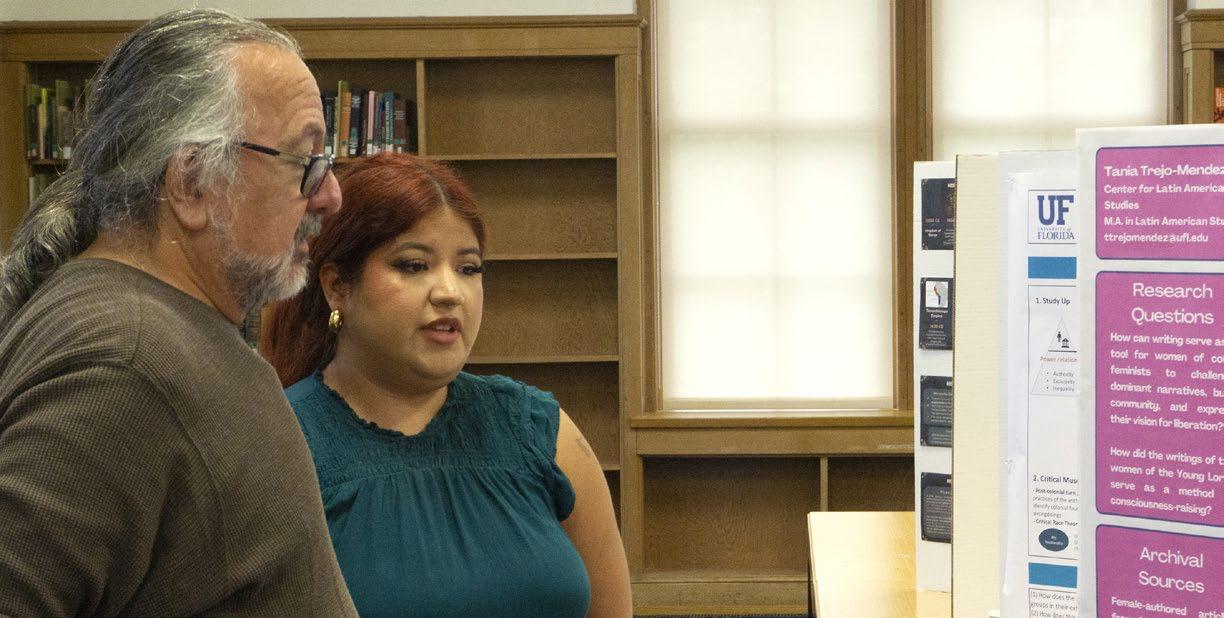

Tropical Conservation and Development
ANA YOKO YKEUTI MEIGA
Impact of Land Use and Land Cover Change on a Threatened Species: A Case Study on Giant Anteaters in the Brazilian Savanna (Cerrado)

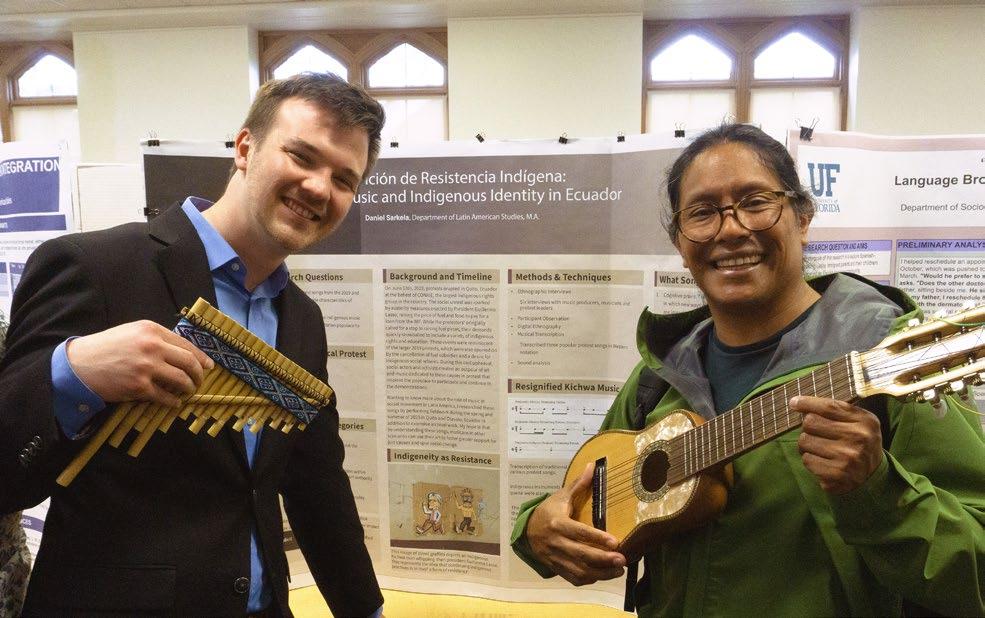
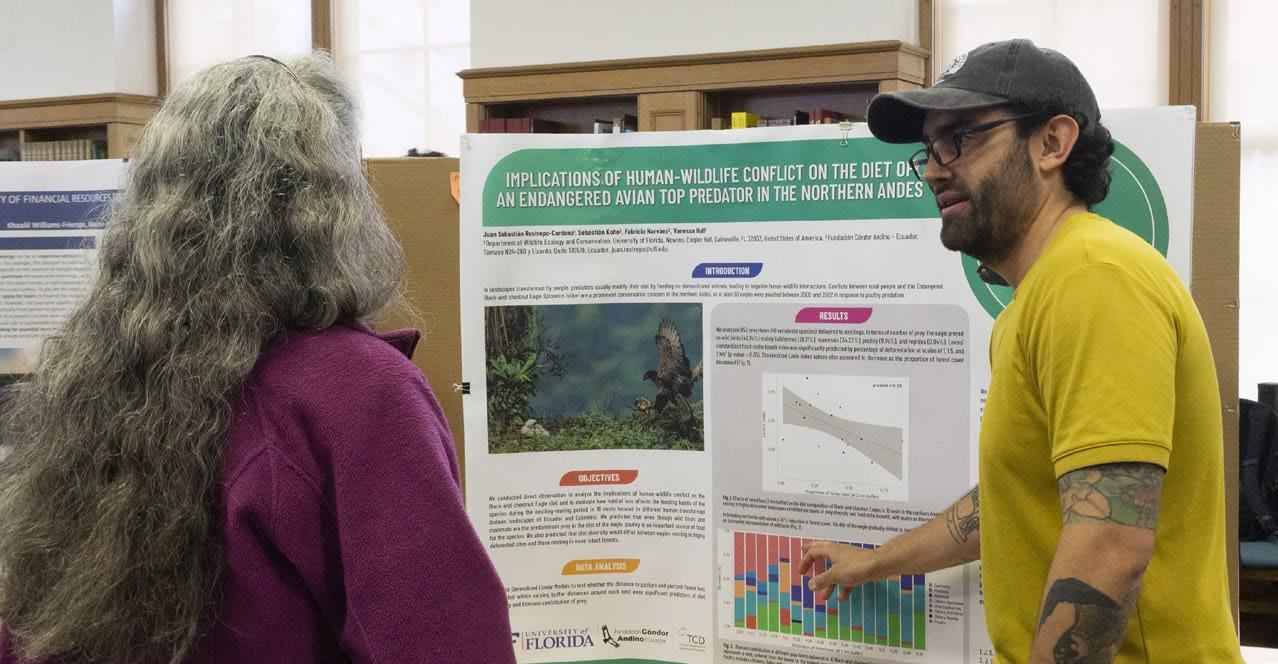


32 ND NAT'L ASSOC. OF AFRICAN AMERICAN STUDIES & AFFILIATES VII CONGRESO DE LA ASOCIACIÓN LATINOAMERICANA DE
AUSTIN, TEXAS, USA ROSARIO, ARGENTINA
BRAZILIAN AU PAIRS MIGRANTS LIVING IN THE AMERICAN DREAM?
Participating in this conference allowed me to showcase my research proposal and gain valuable insights into its presentation dynamics. Witnessing the audience's reactions firsthand offered me a sense of the impact and significance of my work. Moreover, the conference served as an opportunity for intellectual exchange, where I gathered knowledge from diverse presentations and engaging discussions with fellow presenters.


REPRESENTACIONES DE GRUPOS INDÍGENAS Y ARTESANALES LATINOAMERICANOS EN DOS EXHIBICIONES ANTROPOLÓGICAS
Listening to presentations by colleagues working in different Latin American museums enabled me to identify transnational connections and patterns in the work of museum professionals in the region. It was exciting to share some results from my master’s project, and people were genuinely interested in the topic, as well as my internship, the MALAS program, and UF. After the sessions, we had spaces to mingle and get to know each other more. I left with excitement about potential collaborative projects in the future. I also had the chance to buy books, attend other lectures, and participate in cultural events at the Congress throughout the week. However, my favorite part was the experience of visiting a new city in a Latin American country I had not visited before!

2024 LATINA/O/X STUDIES ASSOCIATION CONFERENCE
TEMPE, ARIZONA, USA
DECOLONIAL IMAGINARIES, THEORIES IN THE FLESH, AND THE WRITING OF THE WOMEN OF THE YOUNG LORDS
I was really inspired by the chance to meet amazing scholars from different fields and to talk to them about my own work and where I could take it further when I pursue my PhD. I received pep talks and motivational advice from Latinx studies scholars that I have read or cited before in my classes in the Center, which was really exciting! It was beautiful to chat with people I deeply admire like Dr. Yomaira Figueroa-Vasquez whose work I engaged with within my own thesis. She encouraged me to pursue my interest in an ethnic studies degree and to keep developing my own work. I am so grateful for the chance to meet scholars from across the country who were really interested in my work and in keeping in touch with me as I explore possible PhD programs and a future in academia.

ATHENS, GEORGIA, USA
INTENTIONAL COMMUNITIES AND THE POSSIBILITIES OF DEMOCRATIC CULTURE IN LATIN AMERICA
The conference was a very interesting experience! Besides learning a lot from the different panels, I received feedback on my poster and exchanged experiences with other researchers. I also had the opportunity to act as a facilitator for one of the sessions, with the challenging task of controlling the presenters' time! It was enriching to observe beginner graduate students like me sharing panels with experienced professors.

MALAS student taps into UF library, local connections for customized internship experience
The last time Beatriz Dominguez conducted thesis research, she was attending university in Santiago, Chile—a bustling metropolis of approximately 6.5 million people. After she decided to pursue a MALAS degree at the University of Florida, she found herself living in a college town diminutive by comparison: Gainesville’s approximate 148,000 residents represent just 2.3% of the population of Santiago. “I felt a little bit alienated when I arrived here,” Beatriz explains. “I didn’t feel connected to community the way that I did in Chile.”
But two years later, thanks to the decisions she made as she carried out her MALAS research, Beatriz is graduating from UF deeply embedded in a network of community—at the university, in the city of Gainesville, and across the state of Florida.
Beatriz’s first touchpoint with the community she would eventually serve was riding the bus in Gainesville. Noticing someone else who spoke Spanish, she struck up a conversation and learned about the man’s story migrating from Central America. She began to grasp the extent of the Latino migrant community in Gainesville, and the specific ways in which they lacked support navigating U.S. systems. She was already interested in migration studies; her thesis research was going to focus on migration and domestic work from a cultural anthropology standpoint. But after a series of obstacles in devising the methods and results for research in such a vulnerable community, she found herself reconsidering her plan. “It made me think: what is the point of doing this? Is this really going to help the people in that community?”
So she switched gears, and began to develop a kind of internshipcapstone-thesis hybrid that brought together her skillsets, broadened her connections, and invested her time and resources for tangible impact. Because of her graduate assistantship at the Latin American and Caribbean Collection, Beatriz was already helping with the “Archiving Farmworkers’ Histories” project, led by Center affiliate and LACC librarian Dr. Margarita VargasBetancourt and funded by a National Leadership Grant from the Institute of Museum and Library Services (IMLS). The project’s goal is to create safe, cooperative spaces to archive and access oral histories. To carry out that mission, it brings together a network of partners from community-based organizations, universities,
farmworkers, extension officers, and others to make archival practices more equitable.
Through this valuable connection, Beatriz began to discover her Gainesville community. She reached out to one of the grant’s collaborators, the Rural Women’s Health Project (RWHP), who put her in touch with the Human Rights Coalition (HRC) of Alachua County. The HRC had a dire need for bilingual volunteers to assist at workshops, health fairs, and other community events— something Beatriz could provide. “This had a purpose and gave me concrete material,” she says. “That really excited me.”
According to their website, the HRC of Alachua County is “a non-partisan, non-profit, grassroots organization that promotes networking, collective efforts, and coalition-building around issues, policies, and practices affecting human rights.” One of the major services that the organization offers is the HRC community ID, which gives greater access to local public services through an identification card—something that migrants are unlikely to have in the form of a state-issued driver’s license, and a more prudent option than carrying around a passport in day-to-day life.
Beatriz helped the HRC facilitate not only ID drives, but a range of resource-oriented events, where her bilingual skills and cross-cultural understanding were valuable tools for outreach. Her experience led to her culminating project, “This is not a photoethnography: A critical exploration of AI tools for understanding migratory experiences and at-promise communities,” which will be published as part of the IMLS grant. Beatriz was also recognized with UF’s Presidential Service Award in April, having completed over 200 hours of community service in her two years as a graduate student.
Reflecting on the experience, Beatriz emphasizes the importance of adaptation, something that benefited her as she completely upended her original plan of research. “Try to connect with what’s around you and adapt to what’s happening,” she advises. “Go with the flow—see where the tendencies are going and try to find work that's meaningful, that people are looking for.”
Moreover, she highlights the value of avoiding isolation, whether physical or intellectual. “That’s one thing I recommend to MALAS students,” Beatriz shares. “Don’t isolate yourself in just one field. You never know what might be useful for you. Life takes you everywhere.” In Beatriz’s case, this openness to connection meant that her life took her to Gainesville, to become a part of its community networks, hidden in plain sight. ◆

Colombian MALAS student explores project-based curriculum for life skills in communities affected by armed conflict
MALAS 2024 graduate
Duvan Gulfo Perea might be a fútbol star or a professional musician today, if it weren’t for a required course in social service he took over a decade ago in his hometown of Quibdó, Colombia. His experience working with communities affected by the armed conflict made such an impact on him that he scrapped his original plans and turned toward a career in education. “I saw that I wanted to change the world,” Duvan shrugs with a smile, clearly unbothered by the paths he left behind.
The backdrop of the armed conflict is an important context for the landscape of education in Colombia as well as Duvan’s motivation to pursue his chosen field. After decades marked by violence between the government and armed groups, in 2014 the Colombian legislature passed Ley 1732, which mandated that peace education be incorporated into the national curriculum. By this time, Duvan had begun his undergraduate studies and was teaching English, doing trainings with the British Council and the U.S. Embassy.
But what would peace education in Colombia look like? There wasn’t a standardized way to implement it, and in such a diverse country, a one-size-fits-all model wouldn’t be effective. Schools could take different approaches on facilitating principles for conflict management, relationship building, or teaching strategies, for example.
So when it was time to develop a research project for his MALAS degree, Duvan decided find out some answers himself. Working with collaborators in his network of colleagues, he spent three months in four different rural areas of Colombia to investigate the question. He interviewed educators, students, and other stakeholders in the community, then helped strategize and facilitate activities developed from feedback and pedagogy.
In every region, Duvan brought one unifying element to his approach: mindfulness. Drawing from Buddhist teachings that invite connection to oneself on a higher level of consciousness, Duvan says mindfulness is a valuable strategy for engaging with students from populations highly affected by violence. “There are a lot of testimonies about how conflict brings damage and pain,” he says. “The intention of mindfulness is to help understand those emotions.” In one activity, he and his fellow educators took time to “set the scene” with students before they entered the classroom, so that they could disconnect from any issues going on at home. “It doesn't mean that [the issues] are not going to exist, but it's giving kids a way to respond to the learning experience and not
react from past experiences,” Duvan explains. “It prepares them to articulate new learning and connecting.”
Activities like this also serve to make school feel like a safe environment not only in which to learn, but also to simply exist. Even after the signing of the peace agreements in 2016, many rural areas still live with the threat of armed groups in the vicinity. Duvan points out that mindfulness can help create safe space as a mindset within the kids. In the activity, students define what safety looks like for them, and then reimagine ways to achieve it, even if the terms seem too small, or too complex. “The legacy for these conflicts is a long journey, but the way that we can equip [students] to respond to those situations will determine how they go beyond the current environment that they're facing.”
Over the course of his research, Duvan applied theory to practice with his collaborators, and then gathered for reflection about the results. After analyzing students’ experiences, they shifted their approach to a project-based curriculum with an emphasis on experiential learning. They also concluded that language teaching was a fertile ground for implementing these practices— mindfulness included. “Languages become bridges in how they give you access to other spaces,” he says. “You can use them as tools to expand your own mind.” Accordingly, one part of the research results was the development of what Duvan calls “English for Life,” which adheres to rigorous language requirements, but is flexible in the topics on which it’s applied, particularly in consideration of students’ personal experiences in the communities where they live.
Equipped with these takeaways, Duvan is carrying what he’s learned forward into his next endeavor: working with collaborators to establish a school based on a mindfulness approach in Boquete, Panama. Duvan is leading the academic component, which will be centered on language learning to make connections beyond the classroom and design student-oriented projects. “Our plan is to establish first in Panama and see how that works, then hopefully we can bring this project to Colombia,” Duvan shares.
Though the process of innovating a new type of school to fruition might sound overwhelming, Duvan is drawing not only from his interdisciplinary education at the Center but also leaning on his own skills in listening and collaborating. “There are some things that are not my strength, but I’m working with the right people who can bring their expertise into the right space,” he says. This mentality is part of what makes Duvan’s pivot to education seem like a natural expression of his values. “Moving from a place of fixation to nurturing, that’s what really motivates me. It's a sense of appreciation for otherness, and for oneself as well. I want to sit down with myself and say, ‘Do your best, but continue to grow and keep going.’ That's where the idea of peace really comes to me." ◆

After Nancy Kinnally graduated with her master's degree in Latin American Studies in 1991, she embarked on a career in public relations, where she regularly used her language skills in Spanish and Portuguese to conduct interviews for clients. But in 2023, her work reconnected her to Latin America with even greater significance: she began doing pro bono public relations for the non-profit organization Connecting Roots, which works to reunite stolen children with their biological families in Chile. Read on to learn more about Nancy's career and her work to support the mission of Connecting Roots:
Q: What is your current position?
NANCY KINNALLY: I am founder and CEO of Relatable Communications Group, a strategic communications firm with clients in legal, medical, nonprofit, trade association and other sectors.
Q: How did you get involved with Connecting Roots?
NK: I got involved in Connecting Roots in February of 2023 after its founder and CEO, Tyler Graf, contacted me. Connecting Roots was about to travel to Chile to reunite one of Chile’s stolen children—who was by that time a grown man—with his family. It was an important media opportunity for the organization. Tyler had already gotten significant media coverage by that time, having been featured in The New York Times, Nightline, People, Univision and Telemundo, among other media outlets. I already had a pro bono client, so I almost said no. But when I thought about the opportunity to use my language skills and put my master’s in Latin American Studies to work, I realized that “yes” was the only answer that made sense.
Q: How has your LAS degree helped you in your career, and in working with Connecting Roots?
NK: The main skill or knowledge I have used from my Latin American Studies degree has been my ability to speak Spanish and Portuguese. I learned Portuguese as an undergraduate, but I learned Spanish at UF during my master’s program. I went to the Yucatan with Professor Alan Burns and did my master’s thesis on the education system for Guatemalan refugees living in camps in the Yucatan Peninsula during their country’s civil war.

In my work, I have used both languages to conduct interviews for articles I was writing, usually about legal aid clients, as I have worked with legal aid organizations for the last 16 years. Being familiar with Latin American culture, history and geography has also helped me relate to the interview subjects.
With Connecting Roots, my Latin American Studies degree has been extremely helpful. For one thing, when Tyler contacted me about forced adoptions that occurred under the regime of Augusto Pinochet, I immediately understood the context. And of course, I use Spanish now almost daily when communicating with Connecting Roots leaders and volunteers in Chile, including my public relations counterpart in Santiago.
Q: What is the most challenging part of the work you and Connecting Roots are doing? What is the most rewarding?
NK: The most challenging part is working in an all-volunteer organization with no reliable funding stream. All of us are doing this work in addition to a regular full-time occupation. Tyler is a full-time firefighter for the City of Houston who learned in his late 30s that he
had been kidnapped as an infant and not given up willingly for adoption as he and his adoptive parents had always thought. Since meeting his mother in 2021, he’s made it his mission to help others in his situation learn the truth and reunite with their Chilean families. But he still has to earn a living and support his family. So, he does both. He leads Connecting Roots and fights fires.
This challenge is also part of what makes the work so rewarding. I know that if I weren’t doing this for free, they couldn’t just hire someone to do it. And the work I do is critical, because we don’t have the data on which of Chile’s stolen children were brought to the United States, what their names are now, or where they are living. We have no way to contact them, so the only way we have to let them know that they might have been kidnapped instead of given up for adoption is to get this story out into the world. The adoptees Connecting Roots has reunited with their families have come to the organization after hearing about it in the media. In the first three months of 2024 we generated over 50 stories in outlets
To learn more about the work and how you can support Connecting Roots, please visit connecting-roots.com
such as National Public Radio, The Guardian, CNN Chile, and El País. And we have had discussions with prominent filmmakers about potential projects as well.
Of course, the other rewarding part is seeing the results of the reunions and helping share those stories. All of the adoptees who went to Chile in February said it was the experience of a lifetime and they can’t wait to go back.
Q: What are the next steps/goals for Connecting Roots?
NK: Right now, the organization is working on new cases that were generated by the media coverage from a trip they took in February, during which they reunited five U.S. adoptees with their families. They are researching, doing DNA testing with kits donated by MyHeritage, and organizing Zoom reunions, which is the first step in bringing the Chilean families into contact with their long-lost children. Then, they will organize another reunion trip to Chile so that these adoptees can meet their
Alumni, want to see your update here?
Complete our Alumni Update Form online: bit.ly/3s5H2KA Let us know what's going on with you! Your update might be included in the next issue of the Latinamericanist (space permitting).
Juliana Azoubel (MALAS 2007) “Since I received my MALAS, I have been a Professor of Dance and Head of the Art/Education Department at the Federal University of Paraná from 2009 to 2013, and from 2014 to present, I have been a Professor of Dance at the Federal University of Minas Gerais in Brazil. I have also served as a lecturer/ teacher for the school of Grupo Corpo, the artistic director of Grupo Aruanda, and the creator of the Centro de Formacao do SESC in Belorizonte, a Dance Center that became a reference for social and cultural inclusion through Dance. I am a PhD Candidate, holding the Dance Langston Fellowship, and teaching Dance at Texas Woman's University. I received the Ric Rose Award from the University of Florida School of Theatre and Dance. I will be at UF in January 2025 to teach a Master Class, lecture, and engage with the Dance and Theatre community.”
families in person, and so that mothers, fathers, brothers and sisters can hug their lost family member, in many cases for the first time. Meanwhile, they are continuing to strengthen their organizational infrastructure. They have also held meetings with Chilean governmental agencies and with a judicial task force that is investigating the 20,000 or so cases of irregular or forced adoptions that took place in Chile during the Pinochet era, and they will continue to build those relationships.
Q: How can people get involved with or help Connecting Roots in its mission?
NK: Connecting Roots can always use volunteers, but more than anything right now they need financial support. A volunteer who is knowledgeable about grant writing or fundraising would be incredibly helpful. Donations can be made at connectingroots.com . And anyone interested in volunteering can contact the organization at contactus@connecting-roots.com
Priscila Barravecchia (MALAS 2018) “Next year will be my last year of law school. Throughout law school, I interned for a federal judge at the Northern District Court and interned for the Equal Employment Opportunity Commission. This summer I will be interning for the DeKalb District Attorney’s office, and in fall I will be at the GA Attorney General’s office in the consumer protection unit. Beyond this, I am most proud of leading the Latinx Law student org at my school and helping create pipeline programming and mentorship Latinx students between the undergrad school and the law school. Additionally, outside of law school I am involved in the state’s task force against human trafficking and I am co-chair of the workgroup that focuses on foreign born victims and labor trafficking.”
Connie Campbell (MALAS 1992) “After a post-doc with UF in the Brazilian Amazon, I designed and managed Latin American / Amazon and international tropical conservation programs at WWF, TNC and USAID for about 20 years. I've done numerous consulting contracts for natural resource management projects globally and am currently based in Peru.”
Kleber Naula (MALAS 2023) “I will start my doctoral program in Economic Anthropology at the University of North Carolina at Chapel Hill in fall 2024. My area of research will be indigenous communities in the Andes of Ecuador.”
Miguel Olivas Perez (MDP 2018) Coordinador Técnico y Operativo, Secretaría de Desarrollo Humano y Bien Común, Gobierno del Estado de Chihuahua Campo de la Cruz, Colombia.
Adolfho Romero (MALAS 2021) “This fall, I'll be starting an MS/PhD program at Cornell University in Industrial and Labor Relations. My research will be centered around exploring how organizations, such as unions and non-profits, cultivate environments where workers can have dignity, harness collective power, and have a voice, ultimately empowering them to assume leadership roles. Through an analysis of organizational structures, I aim to identify the key factors that distinguish effective organizations from their less successful counterparts.”
Vanessa Luna (MALAS 2019) has completed her PhD in Interdisciplinary Ecology at UF. Her doctoral research focused on community-based fire management and stakeholder perceptions in Peru, her home country. Her research advanced understanding of the human-fire relationship by bringing theoretical and methodological approaches from multiple disciplines (ecology, geography, political sciences, anthropology). Research and practitioner work on these issues is expected to contribute to local policy-making through crucial scholarship and collaborative activities with local partners. In her last year in the PhD program, Vanessa has been working on various science communication efforts, which included the production of a short documentary and participatory workshops (featured in the video) in November 2023. More info: lunacelino.com
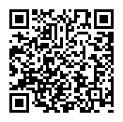
In April, the Center welcomed back seven alumni of Latin American Studies to meet with current students over the course of two days of sessions and workshops. The event began with a welcome brunch and the awarding of the 2023 Alumni Award winners (see below). Students then had the chance to meet one-onone with the alumni to learn more about their careers, how they applied their LAS degree to their work, and what advice they might have for current students of LAS.
In attendance were Steven Keats (LAS certificate '77), Irving Chan Gomez (MDP '16), Larissa Ruiz Baía (MALAS '96), Nancy Kinnally (MALAS '91, see p. 18), Max Nagiel (MALAS '93), Gary Schweitzer (MALAS '74) and Elizabeth Smith (MALAS '09). As the alumni shared their stories, a commonality emerged in that each of them followed an "unconventional" path after graduation, yet still applied skills from their degree in a range of career fields, from marketing to finance to education. They highlighted the importance of fluency in multiple languages, intercultural competence, and adaptability in the face of changing plans and unexpected career opportunities.


This event is part of a growing initiative to engage current students with Center alumni as well as develop a strong network among Center alumni. Thank you to the alumni and students who participated! Alumni, stay tuned for further opportunities to connect with the Center and our students. ◆
Read more about the winners at go.ufl.edu/las-alumni-winners-23

Steven J. Keats (LAS certificate 1977) Vice President, Kestrel Liner Agencies
OUTSTANDING YOUNG ALUMNI WINNER ►
Irving X. Chan Gomez (MDP 2016, LAS & TCD certificates) Strategic Partnerships and Global Growth Manager, B Lab

Undergraduate LAS Certificates & Minors
Patrick Grey Zavala (History, Spanish)
Thais Maradiaga (Public Health)
Anyeli Pro Rivas (International Studies)
Alexander Lionelli (Political Science)
MALAS Degree
Jessica Alvarez Starr
Thesis Topic: Revolutionary Rhetoric: Antislavery and Anticolonial Alliances in Puerto Rican Abolitionist and Nationalist Movements, 1800-1898
Specialization: Latinx Studies, Migration & Transnational Studies
Chair: Fernanda Bretones Lane
Jorge Arcia Duran
Internship Topic: Building Stories in the Museum: Representations of Latin American Artisans and Indigenous Peoples in Two Anthropology Exhibitions
Specialization: Indigenous Studies
Chair: Carmen Martínez Novo
Laura Botero
Thesis Topic: Finding Spaces to Heal: Exploring the Everyday Life Experience of an Indigenous Community Resisting in the Mining Frontiers of The Venezuelan Amazon
Specialization: Tropical Conservation & Development Chair: Rebecca Hanson
Illyamani Castro
Thesis Topic: The Exploitation of Indigenous Bodies: The Children of Yuyaiyaku
Specialization: Indigenous Studies Chair: Porchia Moore
Beatriz Dominguez
Capstone Topic: This is not a photoethnography: A critical exploration of AI tools for understanding migratory experiences and at/promise communities
Specialization: Latinx Studies, Migration & Transnational Studies
Chair: Margarita Vargas-Betancourt
Sarah Dominguez
Capstone Topic: Public Representations of Afro-Mexican History
Specialization: Arts, Literature, and
Culture
Chair: Maya Stanfield-Mazzi
Duvan Gulfo Perea
Capstone Topic: Folding Paper to Unfold the Being: Mindful Teaching and English for Life in RiosucioChocó
Specialization: Education in the Americas
Chair: Pilar Useche
Daniela Hernandez-Gil
Internship Topic: The state of Legal Aid in Florida: A recounting of my internship experience with Three Rivers Legal Service
Specialization: Crime, Law, and Governance in the Americas
Chair: Richard Kernaghan
Rodrigo Mezarina
Thesis Topic: Venezuelan Migration to Lima, Peru: Challenges of Employment Integration for Immigrants in the Capital Specialization: Crime, Law, and Governance in the Americas
Chair: Rebecca Hanson
Jane Perez
Thesis Topic: Prejudicial Politics in Grenada: Politics & Community Building in the Face of Homophobic Rhetoric and Violence
Specialization: Race, Gender, and Sexuality
Chair: Carlos Suárez Carrasquillo
Daniel Sarkela
Thesis Topic: Canción de Resistencia Indígena: Protest Music and Indigenous Identity in Ecuador Specialization: Arts, Literature, and Culture
Chair: Welson Tremura
Tania Trejo-Mendez
Thesis Topic: Mujeres Pa’lante: Writings of the Women of the Young Lords and the Formation of a Third World Feminist Counterpublic Specialization: Latinx Studies, Migration & Transnational Studies
Chair: Rafael Ramírez Solórzano
Graduate LAS Certificates
Isabella Arrazola Diazgranados, Design and Visual Communications
Catalina Baracatt, MDP
Genaro Guerrero, MDP
Mesly Mata Loya, MDP
Mirian Yadira Molina, MDP
Flory Sanabria, Graphic Design and Visual Communication
MDP Degree
Sylvia Adisa
Specializations: Gender & Development, Global Health, African Studies, TCD
Chair: Renata Serra (African Studies)
Field Practicum: “Assessing the contribution of women to Blue Foods production in the Western Indian Ocean (WIO): A case study of the billfish value chain on the Kenyan coast.”
Catalina Baracatt
Specializations: Gender & Development, Global Health, African Studies, Latin American Studies, TCD
Chair: Renata Serra (African Studies)
Field Practicum: “A gender transformative approach in climate information services in Kenya.”
Ashley Dukhu
Specializations: Entrepreneurship, TCD
Chair: Marcia DiStaso (Agricultural Education and Communication)
Field Practicum: “Understanding the perceptions, attitudes, and barriers of Corporate Social Advocacy and how to utilize CSA to establish trust and confidence within organizations.”
Genaro Guerrero
Specializations: African Studies, Latin American Studies, TCD Chair: Sarah Bush (Agricultural Education and Communication)
Field Practicum: “Experiential agricultural education for a secondary school in Bombo, Uganda.”
Raymond Hopkins Specializations: Latin American Studies, TCD Chair: Clate Korsant (Latin American Studies)
Field Practicum: “Rural livelihoods and worldbuilding in Nicaragua.”
Mesly Mata Loya
Specializations: Community-Led Environmental Governance, Latin American Studies, TCD
Chair: Bob Buschbacher (Latin American Studies / School of Natural Resources and Environment)
Field Practicum: “Documenting
monitoring efforts against illegal activities in Indigenous territories of the Brazilian Amazon.”
Mirian Yadira Molina
Specializations: Gender & Development, Entrepreneurship, Latin American Studies, TCD Chair: Karen Kainer (Forest, Fisheries & Geomatics Sciences)
Field Practicum: “Restoring landscapes: a rapid cost-effective analysis of policies influencing restoration practices in Honduras.”
Matthew Sealy
Specializations: Climate Science, Global Health, Latin American Studies, TCD
Committee chair: Renata Serra (African Studies)
Field Practicum: “Agricultural sectoral development in the Small Island State of Tobago: An assessment of needs and opportunities for sustainable development.”
Khaalil Williams-Frierson
Specializations: Entrepreneurship, TCD
Chair: Renata Serra (African Studies)
Field Practicum: “Availability of financial resources for renewable energy: How increased access can lead to a better future.”
Sustainable Development Practice Certificate
Susan Reams, MSc Agricultural Education and Communication
Tropical Conservation and Development Graduate Certificate
Sylvia Adisa, MDP
Catalina Baracatt, MDP
Ashley Dukhu, MDP
Genaro Guerrero, MDP
Raymond Hopkins, MDP
Mesly Mata Loya, MDP
Khaalil Williams-Frierson, MDP
Mirian Yadira Molina, MDP
Tropical Conservation and Development Graduate Concentration
Vanessa Luna Celino, PhD SNRE
Felipe Gutierrez, PhD SFGSS
Fernando Noriego Betancourt, PhD SNRE
Sinomar Ferreira Da Fonseca Junior, PhD SNRE
Jessi Elana Aaron (Spanish & Portuguese) Publication: Aaron, JE. (2024). “Quantifying transitivity: Uncovering relations of gender and power.” Language Variation and Change 36. doi: 10.1017/S0954394524000085 Paper presented: “Trazando dualidades: Transitividad y representación de los indígenas en la Nueva España del siglo XVI al XVII.” Congresos Internacionales de Literatura y Estudios Hispánicos (CILH), Oaxaca, Mexico, March 8-10, 2024 Completed: Designing a Virtual Exchange, Global Learning Institute, University of Florida.
Miguel Acevedo (Wildlife Ecology and Conservation) Team research on recolonization of recovering forests by a Puerto Rican lizard made it to the cover of the journal Ecological Applications: esajournals. onlinelibrary.wiley.com/doi/abs/10.1002/ eap.2875
Leslie Anderson (Political Science) served as the discussant at the book launch for Mateo Jarquin's new book, The Sandinista Revolution: A Global Latin American History (UNC 2024), sponsored by the Center for Latin American Studies (April 5, 2024).
Luis Álvarez-Castro (Spanish & Portuguese) received the College of Liberal Arts and Sciences 2023 International Educator Award in the senior faculty category.
Norman Beatty (Medicine) with multidisciplinary UF team was selected for World Health Organization Health (WHO) 2024 Health for All Film Festival. The short film focuses on work in Florida tackling Chagas disease which impacts 6-7 million Latin American's worldwide. Film one of six featured from the U.S. out of 61 total from around the world. Total entry was 940 films. Watch: youtu.be/WTdIYOLozFk who.int/initiatives/health-for-all-film-festival/ official-selection-and-awards/2024#Health%20 Emergencies
Mark Brenner (Geological Sciences) Publications: (1) Obrist-Farner et al. 2023. Planning for the Lake Izabal Basin Research Endeavor (LIBRE) continental scientific drilling project in eastern Guatemala. doi.org/10.5194/ sd-32-85-2023. (2) Suárez-Mozo et al. 2023. Benthic mollusc communities across space and through time in a hypersaline coastal lagoon, México. doi.org/10.1016/j.ecss.2023.108413. (3) Kutterolf et al. 2023. Workshop on Drilling the Nicaraguan Lakes: Bridging Continents and Oceans (NICA-BRIDGE). doi.org/10.5194/sd32-73-2023. (4) Homann et al. 2023. Past fire dynamics inferred from polycyclic aromatic hydrocarbons and monosaccharide anhydrides in a stalagmite from the archaeological site of
Mayapan, Mexico. doi.org/10.5194/bg-20-32492023
Kenneth Broadway (School of Music) served as artist in residence in Quito, Ecuador in February 2024. He performed and presented masterclasses at the University of Central Ecuador, The National Conservatory, and the Fundacion Cultural Armonia during his stay, working with students from high school level to professional musicians.
Robert Buschbacher (School of Forest, Fisheries, and Geomatics Sciences) led a faculty-student working group on Biocultural Conservation to deepen conceptual understanding, assess how to implement it in practice, and consider how academia can effectively contribute. The group organized a series of four Conservation and Development Forums with distinguished visitors from University of Guelph, Simon Fraser Univ., Field Museum, Terralingua and Indiana Univ. A literature review on the biocultural conservation concept and its implementation in practice was led by Sinomar Fonseca and co-authored by seven graduate students. A white paper on how academic programs can effectively support a biocultural approach to conservation was led by Andrea Chavez and Francisca Saavedra. A conceptual proposal addressed how to put these approaches and principles into practice.
Amy Jo Coffey (Media Production, Management, Technology) Honored with the 2024 Broadcast Education Association (BEA) Textbook Award for my recently published book, "Media Analytics: Understanding Media, Audiences, and Consumers in the 21st Century" (Routledge, 2023) with co-author C. Ann Hollifield. Also gave a panel presentation at the BEA conference (April 13-16, 2024) on AI: The Media Industry Game Changer (Las Vegas, NV).
Kathleen Deagan (Florida Museum of Natural History) Book: “En Bas Saline: A Taíno Town in Haiti Before and after Columbus” University Press of Florida. Gainesville. 2023.
Max Deardorff (History) Bandelier/ Lavrin Book Prize in Colonial Latin American History from the Rocky Mountain Council for Latin American Studies for A Tale of Two Granadas; Winner of the Alfred B. Thomas Book Award from the Southeastern Council of Latin American Studies (SECOLAS); Invited talk: Universidad Nacional de San Marcos, Lima (Peru): “1568 – el año que transformó la Monarquía Hispana,” March 14, 2024
Carlos de la Torre (LAS)
Invited presentation: “Fascismo y populismo: miradas latinoamericanas” Inaugural lecture
to the PhD, MA, and BA in Political Science, University of Guadalajara, February 7, 2024.
Glenn Galloway (MDP - LAS/CAS)
Publications: (1) Pia Katila, Carol Colfer, Wil de Jong, Glen Galloway, Pablo Pacheco, and Georg Winkel (eds.). 2024. Restoring Forests for Sustainable Development: Policies, Practices, Impacts, and the Ways Forward. International Union of Forest Research Organizations’ Special Project World Forests, Society and Environment (IUFRO/WFSE: iufro. org/science/wfse. Oxford University Press. In print. Open access online version will be available. (2) Pia Katila, Wil de Jong, Pablo Pacheco, Georg Winkel, Glenn Galloway, Carol J. Pierce Colfer. 2024. Balancing interests and approaches for equitable, just and sustained forest restoration. IUFRO WFSE Policy Brief. Based on book in (1). iufro.org/fileadmin/ material/science/spps/wfse/wfse-pol-briefequitable-forest-restoration.pdf. International Conference: Context Matters for Forest Restoration, IUFRO WFSE Roundtable in the IUFRO Forest Environment Division 8 Conference 2023 Evora, Portugal, October 24-27. Forested landscapes in the Post-2020 Global Biodiversity Framework: mitigation options towards implementation of the SDGs.
David Geggus (History, Emeritus) published "Kongomania and the Haitian Revolution," The Americas 81:2; "Slave uprisings in French colonies,” in Bibliothèque Nationale de France, La France aux Amériques.
Rebecca Hanson (LAS) Verónica Zubillaga and Rebecca Hanson. 2024. “Shoutings, scoldings, gossip and whispers: Mothers’ responses to armed actors and militarization in two Caracas barrios”. Latin American Research Review 59(1):1-18, Winner of 2023 Best Article Award from the Latin American Studies Association, Section on Venezuelan Studies; Fellowships awarded: Visiting Fellowship at the David Rockefeller Center for Latin American Studies at Harvard University, Fall 2024; Visiting Fellowship at the Kellogg Institute for International Studies at University of Notre Dame, Spring 2025; Book discussions: The paradox of violence in Venezuela: Revolution, crime and policing during Chavismo, Princeton University, April 18; WOLA, Washington DC, March 26; NYU, March 13, CUNY Graduate Studies, March 8, 2024
Ben Hebblethwaite (Languages, Literatures, and Cultures) received a 12-month (2024-2025) fellowship from the National Endowment for the Humanities to work on a book project titled "The Songs and Prayers of Sèvis Ginen: Historical and Linguistic Approaches to Haitian Vodou." Published a review of Jake Johnston's book “How
Haiti Became an Aid State” in Foreign Policy (February 2024).
Tace Hedrick (English) "'Their Walmart Polyester Pants Smell Like Tamales': Chica Lit and the Politics of Latinx Social Mobility." American Fury: Essays on Moral Outrage in Culture and Politics. Edited by Myra Mendible. McFarland, February 2024. 158-171.
Emily Hind (Spanish & Portuguese)
Presented a paper on the axolotl and El Papalote Children’s Museum in Mexico City for the Mexicanist conference held at the University of California, Irvine, April 2024. Received funding for the Mexican publication of the Spanish-language translation of _Dude Lit_ from the Center for Latin American Studies, the College of Liberal Arts and Sciences, and the Center for the Humanities and the Public Sphere.
Karen Kainer (LAS/School of Forest, Fisheries, and Geomatics Sciences) Awards: 1) Faculty of the Year, 202324, Forest Resources and Conservation Graduate Program. 2) Supervision Award for the Outstanding Forest Resources and Conservation Dissertation, 2023 (Johanna Depenthal). Publication: Violato Espada, A.L. and K.A. Kainer. 2024. Decision making processes and power dynamics in timber production co-management: A comparative analysis of seven Brazilian Amazonian community-based projects. Forest Policy and Economics 159:103121. https://doi.org/10.1016/j. forpol.2023.103121.
Clate Korsant (LAS) Presentation: “Reimagining the Future in Practice: Experimental Ethnographic Writing and Ecopedagogy,” in the panel, Anthropologies of the Future? Methods, Ethics, and Applications (Part II) Society for Applied Anthropology, annual conference, Enchantment and Transformation, Santa Fe, NM
Bette Loiselle (Center for Latin American Studies & Department of Wildlife Ecology and Conservation) Blake, J. G., and B. A. Loiselle. Sharp decline in observations and capture rates of Amazonian birds in absence of human disturbance. Global Ecology and Conservation 51:e02902 https://doi.org/10.1016/j.gecco.2024.e02902
Luis Felipe Lomelí (LAS) “Artists and the rise, fall, and rebirth of pulque in Mexican culture and identity,” Visioni LatinoAmericane, Vol. XVI, no. 30, Jan. 2024. Issn 2035-6633, pp. 193-214.
Carmen Martínez Novo (LAS) (1) Named Fulbright Specialist for the period 2024-2027. Will work with an international network of scholars researching Latin American Elites at the Federal University of Ceará in Brazil. (2) Received Rothman Fellowship from the Center for the Humanities in the Public Sphere,
UF for the project: “Surviving Fascism in the Past and Undoing it in the Present: Family Memory and Private Archives in Spain” to conduct fieldwork in Córdoba, Spain. (3) Participated to the “History Behind the News” podcast on the history and current situation of Ecuador. (4) Participated on a Workshop on Authoritarianism and Democratic Backlash in Latin America, Syracuse University, Maxwell School of Citizenship, April 12.
Terry McCoy (LAS Emeritus) has agreed to serve on the Advisory Board of the recently formed Centre for International and Border Studies based in Georgetown Guyana. CIBS will promote research on issues facing the global community with special attention to the CARICOM community, the states of the Guiana Shield and Amazon region. Emphasis will be on border security, energy and food security, migration, the environment and climate change and socio-cultural issues.
Susan Milbrath (Natural History, Florida Museum of Natural History) Book: Decoding the Codex Borgia: Visual Symbols of Time and Space in Ancient Mexico. Gainesville: University Press of Florida, 2024.
Susan Paulson (LAS) Publications: (1) Worldmaking technology entangled with coloniality, racialization, and gender. Environmental Values. Vol. 33(1):71–89. (2) Economics of abundance with degrowth. Real-world Economics Review (106):158-166. (3) Degrowth. In Elgar Encyclopedia of Environmental Sociology. Christine Overdevest, ed. Invited Lectures: (1) Forging pleasurable postgrowth worlds with decolonial feminisms and caring masculinities. Environmental Studies Program, Amherst College, April 2024. (2) Pluriversal learning toward decolonial futures. Centre for Alternative Technology, Machynlleth, Wales, UK, virtual, February 2024. (3) AI, Climate Change and Health: Challenges for Sociocultural Innovation. AI and Health Disparities On A Global Stage. Emory University, February 2024.
Charles A. Perrone (SPS emeritus) chaired the panel <Chico Buarque: 80 Anos> at the XVII Congress of BRASA (Brazilian Studies Association) on April 3, 2024 at SDSU. His own paper “On First Chico Buarque” concerned his 2022 monograph with Bloomsbury Academic in the Brazil 33 1/3 series. Presented “On Galáxias 40 Years Out" on a panel celebrating the forthcoming English translation of Haroldo de Campos' landmark work.
Richard F. Phillips (LACC Emeritus) Publication: "Rosa Quintero Mesa, the University of Florida's liberatory librarianship defied global politics" in Liberatory Librarianship [Chicago : American Library Assn., 2024] p. 21-23.
Rafael Ramírez Solórzano (LAS) Book chapter: “Archiving a Latine Movimiento
in Movement,” in Record, Document, Archive; Constructing the South Out of Region. Exhibits: "Disruptors: Cal State LA Undocumented Working-Class Youth Activism" has been installed at the University Library at CSULA, in collaboration with graduate students from UF. Conference Panels: (1) Moderated a panel in February at the Association for Jotería Arts, Activism, and Scholarship in Los Angeles featuring five MALAS students. Titled, “Otro Mundo es Posible in Florida: Chisme, Strategies, and Stories of Love from the University of Florida.” (2) In April, moderated a panel titled “Be Down with the Brown: Bay Area 90s Youth Activism,” at the National Association for Chicana and Chicano Studies in San Francisco. It was broadcast on the radio show, Hard Knock Radio.
Grady Roberts (Agricultural Education and Communication) (1) Roberts, T. G. (2024). Innovating methods of agricultural development research and practice.
Advancements in Agricultural Development, 5(2), 1–5. doi.org/10.37433/aad.v5i2.461. (2) Rodriguez, M., Dooley, K. E., & Roberts, T. G. (2024). A phenomenological study of intensive experiential learning for university faculty professional development. Journal of Experiential Education, 0(0). doi. org/10.1177/10538259241235915 (3) Boz, Z., Martin-Ryals, A., & Roberts, T. G. (2024, April). Fostering circularity and digitalization skills in future agri-food systems: A case study for preparing the future workforce [Abstract]. Poster presentation at the 5th Global Food Security Conference, Leuven, Belgium.
Leah Rosenberg (English) (1) Edited “Caribbean Arts, Literature, and Environmental Activism,” Special Issue of the Journal of West Indian Literature, vol. 32, no. 1, November 2023 in which published with Shalini Puri, The everyday is everything”: A Conversation with Esther Figueroa,” in the Journal of West Indian Literature, vol. 32, no.1, November 2023, pp. 205-225. (2) Published an article on the Morant Bay Rebellion and British literature, “Empire and Evidence in Armadale and the Morant Bay Rebellion”, in Gilbert, Pamela K., editor. Nineteenth-Century Literature in Transition : The 1860s. Cambridge University Press, 2024, pp.185-202. Virtual exchange: Completed an international virtual exchange with Professor Antonia MacDonald at St George's University in Grenada; courses focused on death and mortuary rituals in the Caribbean and Florida.
Marianne Schmink (LAS/TCD Emerita) (1) Checa, M. F., P. Rosero, M. de Goulaine and M. Schmink. 2024. Butterfly farming for promoting sustainability and ecotourism: a case study of feasibility in Western Ecuador. Tropical Lepidoptera Research 34(1): 29-39. (2) Chau, A. D., M. Schmink, N. W. Taylor, and L. M. Jarrett, Energy Efficiency and Conservation Programs for Low-Income and Minority Homes, Proceedings of International Structural
Engineering and Construction, ISSN 2644-108X, Vol. 10(1), ISEC Press, August 2023. (3) F. de A. Costa, M. Schmink, et. al. 2023. Policy Brief: Land Market and Illegalities: The Deep Roots of Deforestation in the Amazon. Science Panel for the Amazon. (4) Garrett, R., M. Schmink, et al. 2023. Policy Brief: Supporting SocioBioeconomies of Healthy Standing Forests and Flowing Rivers in the Amazon. Science Panel for the Amazon.
Maya Stanfield-Mazzi (Art+Art History)
Journal article: “Global Silk and Imperial Interactions at Mission San Gabriel,” part
of special issue assessing the collections at Mission San Gabriel in Los Angeles, Southern California Quarterly, v. 106(1–2), Spring-Summer 2024: 117–53. Book chapter: “Angels in a New Dimension: Christian Tapestries and the Southern Andean Religious Tradition,” in The Routledge Companion to Global Renaissance Art, eds. Stephen J. Campbell and Stephanie Porras. New York: Taylor & Francis, 2024. Book review: Visual Culture and Indigenous Agency in the Early Americas, ed. Alessia Frassani (2022), 21: Inquiries into Art, History, and the Visual, no. 3, 2023: 557–562.

Paola Uparela (Spanish & Portuguese) (1) Winner of the Klaus Vervuert Hispanic Essay Award for the best book, granted by the Cervantes Institute, the IberoAmerikanisches Institut of Berlín (IAI), German Association of Hispanists (AAH)/Deutscher Hispanistenverband (DHV), the Faculty of Philology - Universidad Complutense de Madrid, the Center for Human and Social Sciences of the Superior Council for Scientific Research (CSIC - Spain), and Iberoamericana Vervuert. (2) Member of the executive committee - Renaissance and Early Modern forum, Modern Languages Association – MLA.

Led by LAS affiliate José Valentino Ruiz (Music) Led by LAS affiliate Norman Beatty (Medicine)
For the second consecutive year, LAS affiliate faculty José Valentino Ruiz, along with students and colleagues, has won the "Best Strategy" category at the International Academy of Digital Arts and Sciences' Anthem® Awards for Education, Art, & Culture. The team is recognized for their Music Business & Entrepreneurship curriculumbased documentary, titled "Getting to the GRAMMYs and Beyond (Part 2): Music Entrepreneurship Curricula Meets the Red Carpet." The documentary also garnered acclaim at the Society of Arts Entrepreneurship Education conference in April 2023 and recently received the Academy of Interactive and Visual Arts' (AIVA) Davey® Award for Film (Education).
This accomplishment underscores the significant strides made by UF's Music Business & Entrepreneurship program in both academic and corporate/industry realms, consistently competing at the national and international levels. "I am optimistic that our collaborative efforts will continue to flourish, fostering even more success in the future," Dr. Valentino Ruiz said.
The Center for Latin American Studies assisted with travel funding for the documentary team. ◆
The documentary "The Kissing Bug Doctors of Florida," featuring LAS affiliate faculty Norman Beatty and his team, was selected for the World Health Organization's 5th annual Health for All Film Festival. The film is featured in the category "Emergencies, Migrants and Refugees Health," along with 15 other selections.
The seven-minute documentary sheds light on the efforts of Dr. Beatty and other UF scientists and doctors to increase awareness, testing, and treatment of Chagas disease, particularly among Latin American migrant communities in Florida. Chagas is a tropical infectious disease caused by the parasite Trypanosoma cruzi, which inhabits an insect colloquially known as the kissing bug, present across the Americas.
The film is eligible for selection as a prize winner in its category, as well as for the festival's grand prize award.
Learn more about the Health for All Film Festival here: who.int/film-festival. If you'd like to support the documentary, you can post about it social media with the hashtag #Film4health. Some comments will be shared during the awards ceremonies at the end of May 2024. ◆
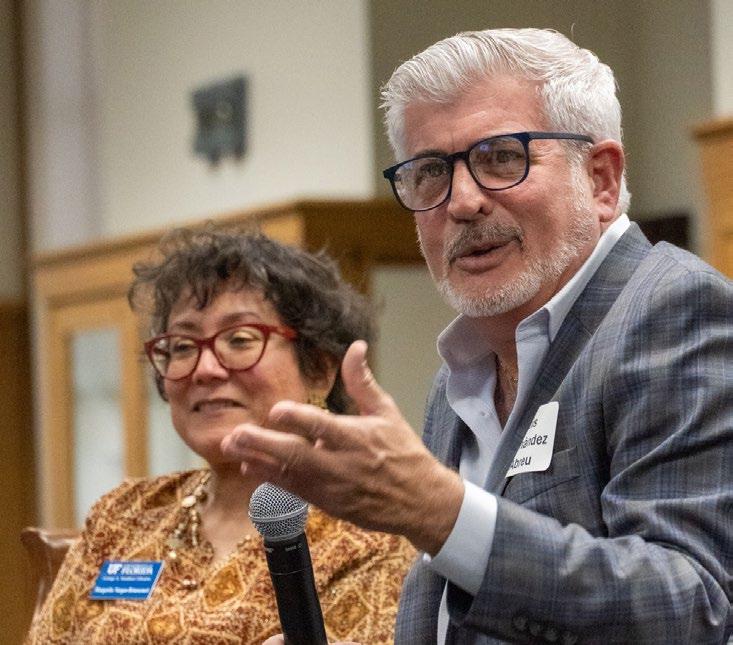
George A. Smathers Libraries Special and Area Studies Collections (SASC) is now home to two prominent collections related to the history of Latin America.
The Eduardo “Guayo” Hernández Papers contains documents, letters, newspaper articles, photographs, slides, correspondence, films, documentaries, and ephemera. Guayo was one of the premiere cameramen and journalists of pre-revolution Cuba. Later,
disenchanted with Castro’s regime ideals, Guayo left Cuba and worked in Venezuela, Puerto Rico, and Miami.
The collection, donated by his son Luis Hernández Abreu, is an invaluable resource that documents Cuba before, during, and after the revolution, covering counter-revolutionary missions to Cuba with Brigada 2506 and Alpha 66.
A gift of Andrew Szentgyorgyi and his family, the Andrew St. George Collection comprises over 8,000 photographic prints, negatives, slides, contact sheets as well as manuscripts and documents presenting the experiences and vast work of one of the most prolific and historically important photojournalists of the 20th century.
The collection documents Andrew's early contributions to the liberation of Hungary from Nazi control and democratic struggles against dictatorship in Cuba as well as the Caribbean and Latin America more broadly from the mid-1950s through the early 1970s.
Smathers Libraries hosted two events commemorating the acquisition of these collections, featuring Center affiliate faculty Lillian Guerra (History) and Margarita Vargas-Betancourt (LACC), archivist Martha Kapelewski (SASC), and special guests from family and friends of Guayo and Andrew, including Luis Hernández Abreu, Andrew Szentgyorgyi, and Tom Szentgyorgyi, who participated in Q&A sessions. ◆
Corina Jimenez-Gomez Psychology College of Liberal Arts and Sciences
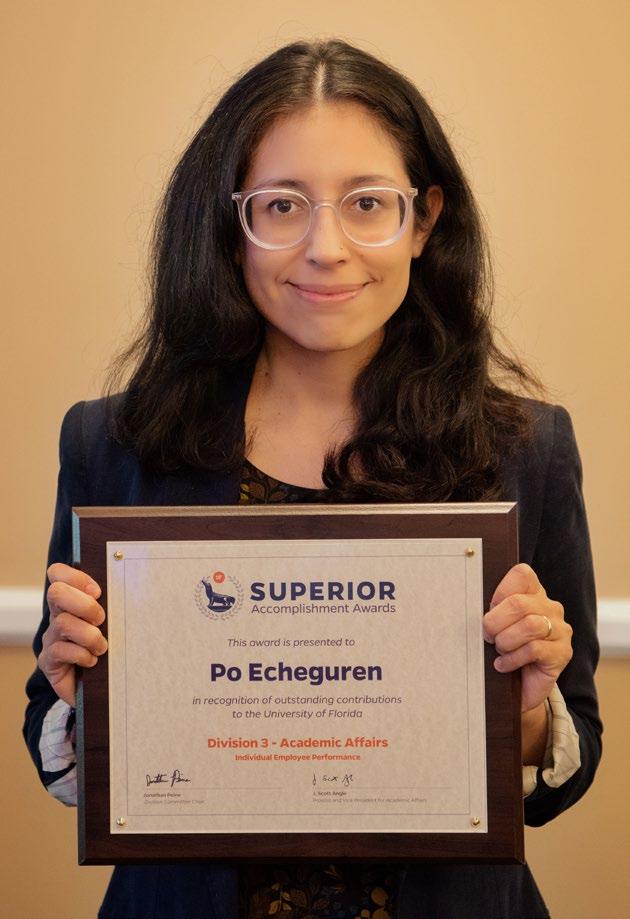
Luis Alfonso Mejia Puig Interior Design Design, Construction, and Planning
Academic Assistant III Po Echeguren has been awarded the Division III Superior Accomplishment Award for her exceptional efforts in supporting Center faculty and students. Among the testimonies to Po's excellent performance, a common theme emerged: the tandem level of care applied to academic administrative procedures as well as for the people working within those processes. One faculty member said: "Po's deep institutional knowledge and responsibility keep our programs going, and her generous humanity keeps our work and our workplace positive." From another: "Po is an Academic Assistant who provides not only procedural and institutional guidance, but a level of detail, organization, and care that directly impacts the quality of life and work for all of us within the Center." One student noted, "Po has been a steadying force in hearing concerns and offering solutions. She finds resources for students that are genuinely applicable and provides real support."
Congratulations to Po Echeguren, and thank you for all you do for the Center! ◆
The Center for Latin American Studies would like to express gratitude for the generosity of those who have contributed to the Center’s funds and endowments:
Safa Graduate Student Travel Endowment
Dr. Hannah H. Covert
Richmond F. Brown Graduate Student Fund
Mrs. Tonyaa and Mr. Wallace Weathersbee
Colonel Glenn A. Farris Scholarship
Ms. Christine Farris-Edwards & Mr. Thomas Edwards
Cuba Program Fund
Dr. Juan L. Riera
Jacqueline Friel & Jonathan Friel International Travel Fund
Dr. Michael K. Friel
Latin American Studies Unrestricted Fund
Ms. Allison Alsup
Mr. Donald E. D'Orto Jr
Mr. Thomas F. Gilfix & Mrs. Ana Gilfix
Ms. Kendall G. Jung
Mr. Steven J. Keats
Mr. Mark P. Kisker & Mrs. Deborah E. Kisker
Mr. Stephen M. Knight & Mrs. Lisa M. Knight
Ms. Hali McKinley
Mr. Norman E. Portillo & Dr. Margaret B. Portillo
Mr. Samuel Szomstein
Mr. Christian Torroella & Mrs. Maria L. Torroella
Latin American Studies Alumni Graduate Student Travel Fund Mr. Steven J. Keats
Carol French Doughty Memorial Fund
Dr. Carmen Diana Deere
Tropical Conservation and Development Fund
Dr. John G. Blake & Dr. Bette A. Loiselle
Ms. Stephanie Bohlman & Mr. Jeremy W. Lichstein
Mr. Sinomar Ferreira Da Fonseca
Mr. Glenn Galloway
Dr. Robert E. Godshalk & Ms. Vicki McGrath
Dr. Karen A. Kainer & Mr. Jonathan L. Dain
Dr. Bette A. Loiselle & Dr. John G. Blake
Dr. Gabrielle R. Salazar
Dr. Catherine M. Tucker & Mr. Percy Iruri
Schmink Fund for Innovation in Tropical Conservation and Development
Mr. Glenn Galloway
Mr. Felipe V. Gutierrez
Dr. Bette A. Loiselle & Dr. John G. Blake
Mrs. Michele Y. Thompson & Mr. Mark T. Thompson
Carmen Diana Deere Director's Fund
Ms. Janet Bente Romero & Mr. Todd L. Romero
Dr. Carmen Diana Deere
Mr. Glenn Galloway
MDP Program Unrestricted
Mr. Glenn Galloway
Dr. Bette A. Loiselle &
Dr. John G. Blake
Ms. Cheryl Melidosian
Dr. Marta L. Wayne & Dr. Charles F. Baer
Kislak Family Foundation Artist/Writer in Residence at the Center for Latin American Studies
Kislak Family Foundation, Inc.
Please email Communications Specialist Christa Markley at communications@latam.ufl.edu . The Latinamericanist features the impact of the UF Center for Latin American Studies through the experiences and accomplishments of its students, faculty, and alumni. Relevant stories will be considered for publication.




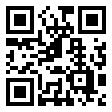
The contents of this newsletter were developed under the National Resource Center grant from the U.S. Department of Education. However, those contents do not necessarily represent the policy of the U.S. Department of Education, and you should not assume endorsement by the Federal Government.
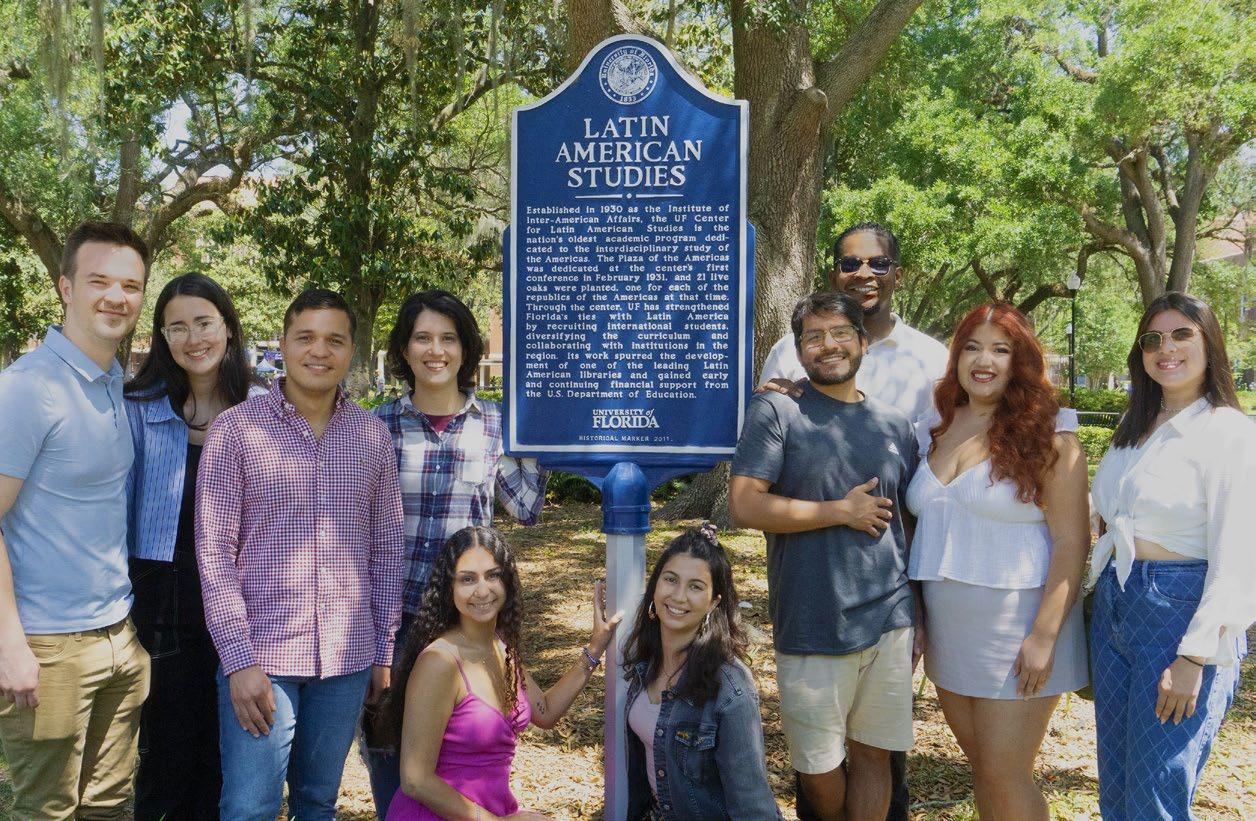
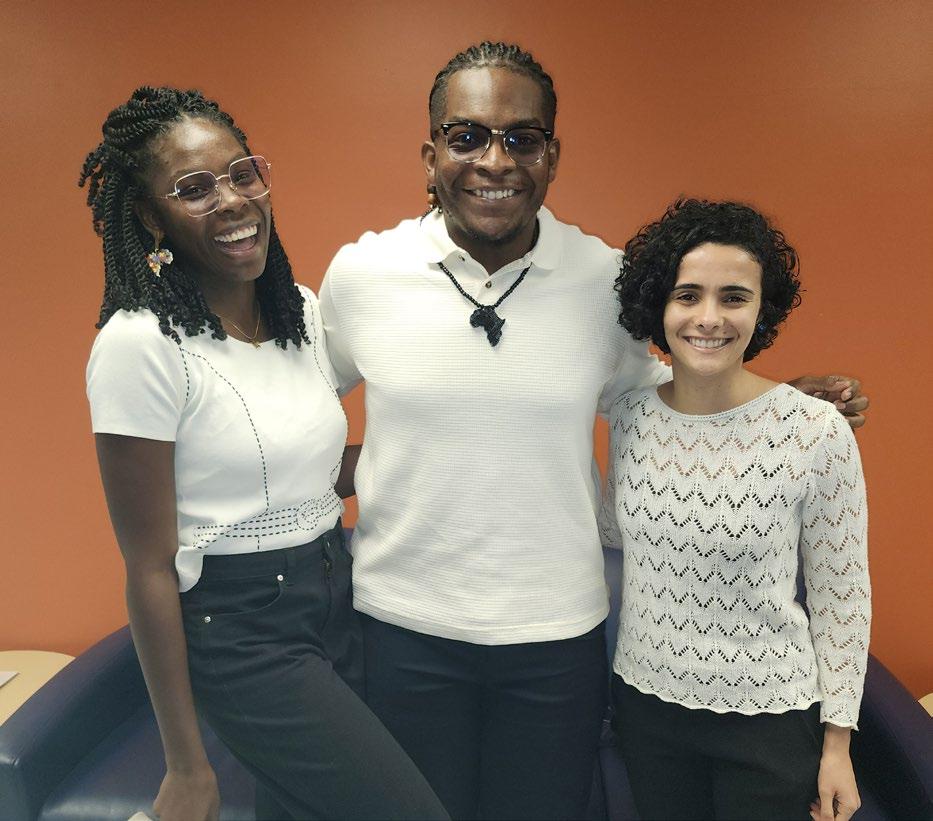
MALAS 2024 cohort; Graduate assistants and MALAS students Sixta Chaverra (2025), Duvan Gulfo


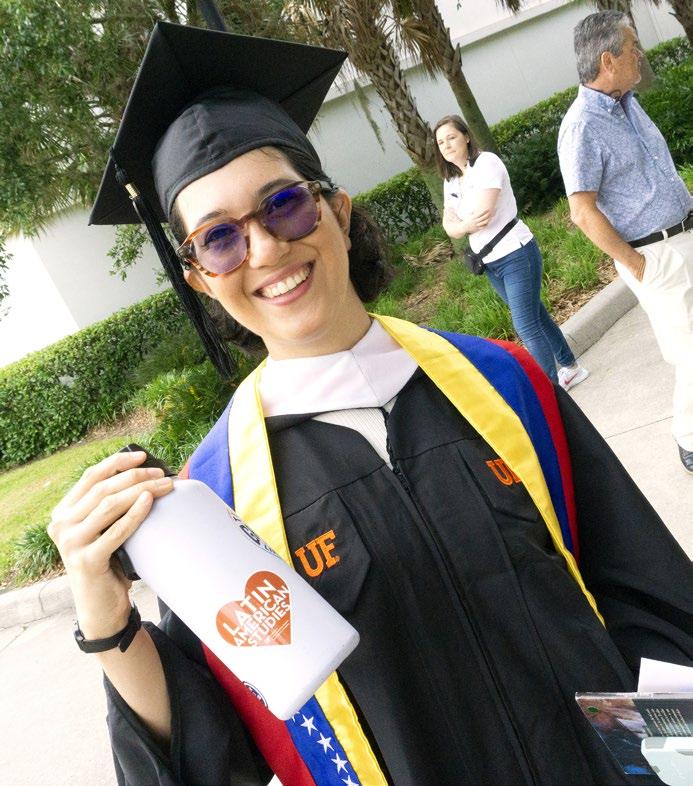
L-R: Center staff and faculty celebrate International Women's Day; MALAS student Ana Ramírez in the LACC Reading Room; MALAS graduate Laura Botero shows off her Latin American Studies sticker at graduation


L-R: Center staff Po Echeguren assists Jane Perez (MALAS 2024) with her regalia at graduation; Center faculty gather to celebrate LAS and MDP graduates at graduation dinner
L-R: Perea (2024), and Thais Zschaber (2025)
Center for Latin American Studies
319 Grinter Hall
P.O. Box 115530
Gainesville, FL 32611-5530
We rely on contributions from our friends and alumni to support certain special activities such as student field research, travel to conferences, and seed support for larger fundraising efforts. If you would like to make a donation to the Center, please visit the Center’s online giving page at go.ufl.edu/las-give or fill out the form below.
MY GIFT IS TO BENEFIT:
• Boonstra Family Research Fellowship (014091)
• Carmen Diana Deere Director’s Fund (019905)
• Carol French Doughty Memorial Fund (016269)
• Colonel Glenn A. Farris Scholarship (005067)
• Cuba Program Fund (017435)
• Florida-Brazil Institute (007277)
• Peter E. and Marie E. Hildebrand Scholarship Fund (022009)
• LAS Alumni Graduate Student Travel Fund (012521)
• Latin American Studies Fund (011147)
• McCoy Travel Scholarship Fund (014527)
• MDP Program Unrestricted (020485)
• Hugh L. Popenoe Mesoamerican Research Endowment (018331)
• Richmond F. Brown Graduate Student Fund (020871)
• Safa Graduate Student Travel Endowment (013515)
• Schmink Fund for Innovation in TCD (018201)
• Tropical Conservation and Development Fund (017809)
• Vivian G. Nolan Graduate Fellowship in LAS (016143)
• Wagley and Carter Fellowships (004763)
GIFT AMOUNT:
$500 $250 $100 $50 $_________
Name:
Address:
City/State/Zip:
Email:
METHOD OF PAYMENT:
• Check (Make check payable to: UF Foundation, Inc.) Please send your check with this form to: University of Florida Foundation Gift Processing Department P.O. Box 14425 Gainesville, FL 32604-2425
• Credit Card Call the UF Foundation’s Gift Processing toll-free number with your credit card information: 1-877-351-2377
This secure line is staffed Monday – Friday from 8:00 am to 4:30 pm
• Online at go.ufl.edu/las-give